Cesma News
CESMA NEWS
JUNE 2024
CONFEDERATION OF EUROPEAN SHIPMASTERS’ ASSOCIATIONS
COUNCIL & AGA OPENING WORDS
23RD & 24TH MAY, ROTTERDAM
Dear Colleagues, Distinguished Guests,
On behalf of CESMA Board warm welcome to 29th CESMA Council Meeting and AGA in Rotterdam, The Netherlands. Rotterdam is very special place for CESMA as that was the place of residence of our former Secretary General and trigger of the organization from the very beginning till the year of 2019 when Capt. Fredrick Van Wijnen passed away. We have to start our event with a tribute to our honorary member Capt. Fredrick Van Wijnen. He spent many years devoting his life to the cause of wellbeing of European shipmasters. His participations in EU projects and his meetings with the key figures of European and International shipping community raised the importance of CESMA as voice of EU shipmasters when the important decisions are taken about safety and security in shipping and the entire job of shipmasters. He was also always ready and assisted in solving the problem cases with captains in our member associations from Croatia, Bulgaria, Italy, and Germany. Our best tribute to Capt. Van Wijnen will be continuation of his ideas and maintaining the right heading of CESMA persuing its goals in favor of shipmasters.
First of all I want to thank Bulgarian Shipmasters Association for the excellent organization of 28th CESMA AGA in Varna, Bulgaria. In a warm athmosphere we had fruitful discussions and we took our decisions. Also I want to thank the host organization this year NVKK for the amazing event venue they had choosen and I hope that here in the biggest European port we will find solution for the challenges in front of ship captains.
The challenging political situation in the world with the wars in Gaza strip and Ukraine, piracy in Indian Ocean and Gulf of Guinea, increasing stress on board ships with increased administrative burden, decrease of the number of crew on board ships, more frequent inspections of ships lead to shortage of well prepared seafarers on board ships and forced shipping companies to employ labour from non traditional maritime countries and increase of diversity of crew on board ships. Nowadays we could see people from several nationalities with different cultures, religions and behaviour on board one ship and the ship master has to tackle them together in order to sail the ship safely and securely. We faced entirely new problems to be solved connected with maritime law. We have armed attacks on commercial ships. At the moment we have ship captains and crews taken as hostages from military and paramilitary national forces. The recent cases in the Red Sea with m/v Galaxy Leader and in Persian Gulf with m/v MSC Aries raised completely new precedents in the International Maritime Law either public or private. We have many nationalities among the crew on board both ships and thus many countries involved. As the problem is political the safety of the crew and fair treatment could be ensured only with the coordinated actions of international organizations and diplomatic efforts of the countries involved. CESMA as EU organization urged EU institutions in short term to send military mission in the endangered areas together with other international military forces of EU allies to ensure safety and security of the navigation in those areas and in long term to raise the problem at IMO and UN.
Another challenging point on board the ships is changed life style all over the world and increased difference in the mentality and behaviour of the generations. One of the main goals of CESMA is to safeguard the traditional navigational skills of EU seafarers. Digitalisation and automation changed our life and new generations come to the ships with new skills but also with new mentality. And that requires ship masters to mediate between the generations and each crewmember to do his job without entering in the private space of the different thinkers. I’ll use the recent event in the European musical life EUROVISION where as per my private opinion the orginizers went too far awarding person quite far from traditional manner and style of living. Hopefully that modern trend will not go beyond the normal human relationships but in the future we have to be careful and to ask the policy makers in the maritime industry to bear in mind the specific conditions on board the ships, the hard environment at sea when preparing living and 3 working conditions on board ships.
With the above said I open 29th CESMA Council Meeting and AGA and I wish fruitfull sharing of information, discussions and right decisions in favour of the ship masters and EU and international maritime industry.
Capt. Dimitar DIMITROV, PHD, FNI
President of CESMA
29th CESMA COUNCIL MINUTES, 23rd May, ROTTERDAM
Those present:
Captain D. Dimitrov President, BSMA, Bulgaria
Captain G. Ribaric Deputy President, ZPU, Slovenia
Captain M. Badell Serra Vice President, ACCMM, Spain
Captain H. Ardillon Secretary General, AFCAN, France
Captain H. Ammerlaan Administrator, NVKK, Netherlands
Captain D. Lakos Webmaster, ZHUPK, Croatia
Captain L. Van Den Ende NVKK, The Netherlands
Captain I. Conev BSMA, Bulgaria
Captain I. Paskov BSMA, Bulgaria
Captain W.Martens VDKS, Germany
Mrs. Z. Sanchez Varela ZHUPK, Croatia
Captain T. Crowley IIMM, Ireland
Captain A. Pels KBZ, Belgium
Captain G. Lettich CNPC, Italy
Captain M. Giannelli USCLAC, Italy
Captain M. Carobolante CTPC, Italy
Captain F. Vanoosten HYDROS, France.
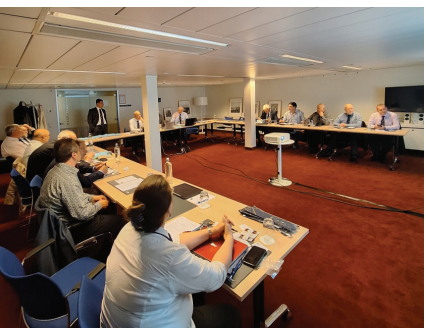
ITEM 1: OPENING BY THE PRESIDENT
The President, Captain Dimitar DIMITROV opened the 29th CESMA Council Meeting on board SS Rotterdam in Rotterdam. He expressed his thanks to NVKK for organization of present Council and AGA and to Bulgarian Captains from BSMA for the organization of previous Council and AGA at Varna last year. He has a deep thought for previous Secretary General of CESMA, Capt Fredrick van Wijnen who deceased in 2019 after passing long years in the board of CESMA.
Then Capt. Leen Van den ENDE, president of NVKK, gave some welcome words to all Council Members. The Council is hold on the SS Rotterdam, a cruise vessel built in 1956, and after years at sea, she is now at berth at Rotterdam as an hotel. Of course we are on a vessel, but he has some reassuring words, as after checking with hotel reception, he can announce that no safety drills will be carried on that day.
Then President Capt. Dimitar DIMITROV declared open the 29th Council of CESMA, having no doubt that the discussions these two days will be on important subjects for seafarers and captains.
ITEM 2: APOLOGIES
Apologies are received from Members not able to come, due to work, economic or personal reasons (Finland-HSF, Italy-IYM, Latvia-LKKA, Lithuania-LCC, UPKCG-Montenegro, PortugalSINCOMAR, Romania-ANCR). It is however noted that Latvia-LKKA has sent a proxy vote for items 6 and 11 of the agenda.
Capt. Mariano BADELL says that he is also representing AVCCMM, Spain. As IFSMA was invited to come, but unfortunately unavailable due MSC meeting in IMO, Capt. Van den ENDE, being also vice-president of IFSMA is representing IFSMA.
ITEM 3: PRESENTATION OF COUNCIL MEMBERS
As usual, each council member presents himself and mentions the shipmasters’ association and which country he represents.
ITEM 4: ADOPTION OF THE AGENDA
The agenda, as presented, was adopted.
ITEM 5: ADOPTION OF THE MINUTES OF THE 28TH COUNCIL, VARNA, MAY 2023.
Captain DIMITROV, CESMA President informed the floor that the minutes of 28th Council Meeting had been agreed after the event and already published in CESMA Newsletter. It was sent also by Secretary General several weeks before actual Council and posted on the CESMA website / Members area. No remark had been reported and the minutes had been adopted unanimously.
ITEM 6: RIJEKA ASSOCIATION APPLICATION
Capt. Hubert ARDILLON, Secretary General, reminded to all Council Members that all documents from UPKSJ and ZHUPK related to this Application were sent some days before the vote in order for everyone to be aware of the proposition.
Capt. ARDILLON makes a short story about the application, when it was received, including partly of the mails received from the both Croatian parties. Particularly, he reminds that UPKSJ was before part of ZHUPK, and decided to separate from ZHUPK on own willing. But being part of ZHUPK, the voice of UPKSJ was already heard in CESMA.
Capt. Bero VRANIC who was with us at that time and delegated by UPKSJ President Capt. Juraj KARNINCIC makes also a brief summary and explains shortly about why UPKSJ separated from ZHUPK at end of December 2023.
Before to proceed to the vote, by secret bulletins, it is decided to have the “coffee break” which could permit to Members to have discussions between themselves.
Then, it is the vote, for which two assessors are nominated: Capt. Leen van den ENDE and Capt. I. PESHKOV who do not participate to the vote, NVKK vote from Capt. H. AMMERLAAN, and BSMA vote from Capt. I. CONEV. As there are 11 countries to vote, 10 present and one by proxy, it is decided unanimously that the majority of 2/3 will be counted at 7.
After counting, the result gives for YES 4 votes, and for NO 7 votes. As result, the Application of UPKSJ to be Member of CESMA is rejected.
Capt. Bero VRANIC takes note of the result and decides to leave the Assembly even if President Capt. DIMITROV tells him that he could stay with us.
After the vote, Capt. Crowley in the name of IIMM makes the following statement:
“CESMA is a confederation of bringing associations together. The existing arrangement of associations is a foundation from which to build upon this principle.
If we are to support separation and fracturing of organizations and associations, this will diminish and dilute effective representation. It would support and endorse creation of more associations. Going forward this would result in additional administrative complications, not being in alignment with the spirit of united membership.
It would subject the confederation to more conditions and erode benefits.”
ITEM 7: RENDERING OF THE 2023 FINANCIAL PAPERS.
The financial papers were presented by Secretary General.
Balance of Accounts – Total of both Accounts (Directors and Savings), we see a difference of some 9 000 Euros between the years 2022 and 2023. We were able to save 7 000 Euros this year. On December 2023, we have 60 700 Euros on the saving account, to be compared with the 16 500 Euros yearly budget. And if we add the 21 500 Euros on director account at the same date that means we have almost 5 years budget on both accounts.
Assets:
We have enough plaques for probably two years more. It will become necessary to see for new plaques, where, model, price and how much, maybe in 2025.
Computer is out of the balance. And it is not necessary to buy a new one. We never go to the office for working on, and Hans has removed it.
About ties, we can wait at least two years more before to get new.
Income:
Even if missing two subscriptions, we are above the figure budgeted.
One of the missing subscriptions is from Montenegro; however same was paid concurrently with 2024 subscription. The other one missing is from Lithuania, and this is the third following year without subscription. And today for 2024, we have still one subscription missing: Lithuania.
Income on Saving account: Interests are coming back. We can note that for the two first quarters of 2024, interests are already more than full year in 2023.
Expenditure:
Office rent: we paid in 2023 for one year and a half, but only half a year was paid in 2022.
Website: Much less than budgeted. All is now with Totohost in Croatia. For a good price. Now waiting the answer for to cancel the old email (@previder.nl). It should be cancelled in 2024. In progress.
Banking fees: Budget was increased according to the monthly fees.
Travel board: Just more than half what was budgeted, expenses for travelling to Lisbon, Cork, Brest and Brussels. See with the Activities report.
Board meeting: was done on video. AGA: 1 000 Euros saved compared with what was budgeted. All Board Members are also coming to AGA for their own association, which explains.
Newsletter: In the budget, the difference each editing is due to the stamps costs.
Amended budget 2024:
AGA: NVKK asks for a help this year. Waiting for exact amount. AGA is budgeted in order to have no saving this year. Subscription fees:
Due to amount on saving account, it is not proposed to increase the fees. And it is not proposed to decrease them.
Proposed budget 2025:
It is proposed to have for 2025 the same budget than the one amended for 2024
To conclude the financial papers had been adopted.
ITEM 8: SECRETARY GENERAL’S REPORT
Captain ARDILLON presents the Secretary General’s Report which gives the activities of CESMA in the year 2023.
In 2023 were meetings holds on internet. This is still a consequence of the virus, most of meetings and conferences can be attended on site and/or on line.
On the subjects were:
● still the wellbeing of seafarers, and a special thanks to Irish member of Cesma Bill Kavanagh for organization;
● skills at sea, actual skills and there are several European projects with different maritime academies, actual skills include English and especially maritime English, another important point in skills is the cyber knowledge;
● also future skills are on the table, the coming of new fuels generates, at last, researches on the safety for these new fuels,
mainly during bunkering at port, there are still great uncertainties about the react of some new fuels in case of important
leaks ;
● how to attract youth to become seafarer, and it can be noted that, with the exception of MASS seminar in Split, the goal of “no seafarer on board” is not on the table when discussion are about attractiveness and skills.
And how to attract, knowing that since October, it became obvious that in all meetings, even if not dedicated to, were also a place to discuss about security in Red Sea and Gulf of Aden.
And it was still the case during the first months of 2024. Even if the views of some speakers are not reflecting exactly the problems of seafarers and masters.
About the war in Ukraine and its consequences for Ukrainian and Russian seafarers, it is noted also that it is like if the war ended already. After two years, it does not represent a main subject, like if quite normal situation. Of course, another war came on the front, and as the Red Sea problem is much more important for economic deciders, not for seafarer point of view, the Ukrainian problem seems to be considered solved.
European Maritime Days in Brest, CESMA attends during the two full days. Main subject is the environment. This year it is next week at Svendborg in Denmark, and it is not scheduled for CESMA to attend. Following the program, subjects are: Sustainable Blue Economy, Fisheries and Aquaculture. In 2025 EMD should be at Cork, when dates will be known, we will see with our friends from IIMM how to assist to.
In 2023, we were able to meet EMSA at Lisbon, and we expect to be able to do same next year. To meet EMSA on a two or three years basis seems to be good.
In few weeks we will have in Europe a new assembly of deputies. That means, for SG, few hours in front of computer in order to collect new email addresses, mainly for Searica group, and after we will try to contact new and reelected deputies to meet them if possible. Knowing that each one of us can try also to meet own national European deputies. When the new Searica group will be known, SG will send tl Members the list of concerned deputies.
At the end, Secretary General would like here to express thanks to some of our Associations which organize a conference or seminar. And second thanks when the same can send a report for to be edited in the CESMA Newsletter.
It is important to do so, because that also shows to the CESMA Newsletter readers that we are participating to conferences and able to give our thoughts. And, why not, it could also give one idea to another Association. Non exhaustive list is on the table: green shipping, cyber security, news fuels, safety on board and in port, navigation and unmanned vessels, and security at sea.
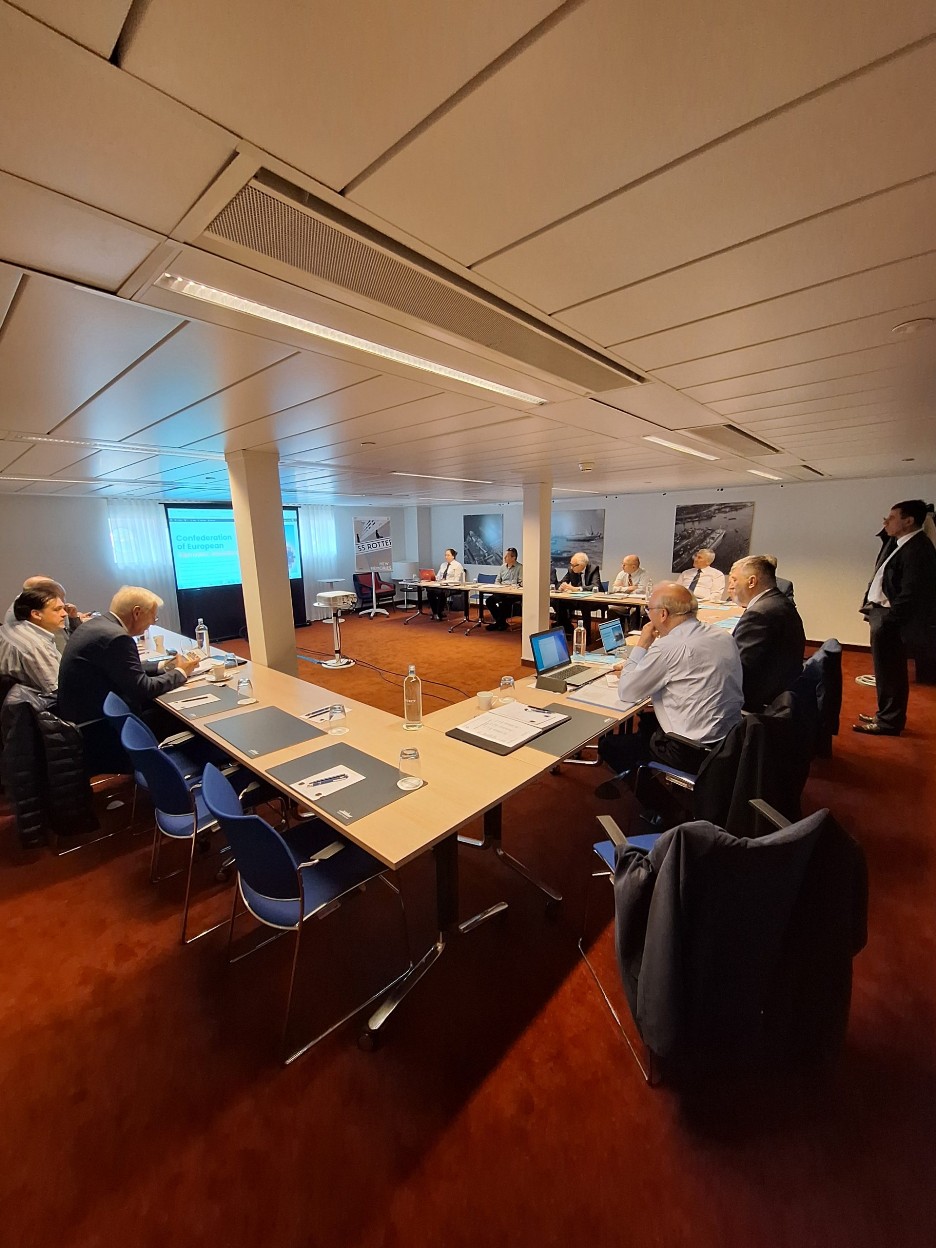
ITEM 9: INTERNET SITE
The ownership of web site is now entitled to CESMA, one gmail address (cesmaeurope@ gmail.com) is created and it will receive all mails with invoices from the web hosting.
A general overview will be done on website in order to verify all data of the Associations (name, phone, mail, etc.).
ITEM 10: STATUTES AND BY-LAWS
Changes proposed consist of inserting the Webmaster in the Board as an associated member (same than Administrator). Of course the duties of Webmaster are inserted, and the duties of Secretary General are modified consequently.
After discussion a new version of By-Law Annex 19-a is adopted unanimously.
ITEM 11: CESMA BOARD RENEWAL
The four Board members elected were so in 2021 (3 years ago) and in 2020 for the vice president (who was allowed to extend by one year in 2022 at Varna).
The four members are candidates for a second term in the Board. No other candidates come from Associations.
Vote is done for each Board position. All four Board members are reelected for a second term of three years unanimously.
ITEM 12: MEMBERSHIP
After the controversial vote for UPKSJ Application, it seems it become necessary to review the process of Application. Proposal should be done before next Council – modification of ByLaw – to clarify the process.
It is also proposed by President to hold the annual Board Meeting in one Member Association office or country, changing yearl.
About Lithuanian Association, Board will try again to contact it, maybe with the help of Latvia Association.
ITEM 13: COOPERATION WITH OTHER ORGANISATIONS.
We have good contacts with IFSMA, particularly for the Red Sea matter, with exchanges on security measures. President is also in close contact with EMPA.
ITEM 14/15: RESOLUTIONS (FROM 28TH AGA & NEW PROPOSALS).
Past year resolutions were discussed and amended, new resolutions are proposed by members to the Council.
ITEM 16: INVITATION FOR THE NEXT AGA.
Secretary General Capt. ARDILLON reads a message from Portuguese Member Association SINCOMAR telling that SINCOMAR is candidate to organize the 30th Council and AGA in Lisbon in May 2025. President Capt. DIMITROV shows a power point to present Lisbon and the facilities where Council and AGA could be organized. Intention is to hold the Council in SINCOMER office and AGA in EMSA premises. A letter is sent soon after the Council to ask EMSA for authorization.
ITEM 17: ANY OTHER MATERS
Capt. Giovanni LETTICH, CNPC Italy, makes an update of the Jolly Nero case. It is actually the second trial and the sentences should be known end of June, all going well. Of course as soon the result known, same will be forwarded to all Members.
Actual sentences required are: Captain for 7 years, First Officer for 5 years, and Chief Engineer for 4 years.
Capt. Damir LAKOS reports about one Croatian captain actually in prison in Turkey. During loading in Colombia, during search by Columbian Authorities drugs were found on board and taken ashore, then vessel was release to sail to Turkey. Captain reported same to the agent of the vessel, and to the local authorities at arrival port in Turkey. Turkish authorities came on board and again some drugs were discovered. As a consequence, and despite the facts that the captain warned for the first discovery, all the crew – 9 members including captain, were arrested and imprisoned. Next step will be around mid-June at the court. However it is already required 15 000 Euros and again 100 000 Euros for defending. The imprisoned captain being member of the Split Association, part of ZHUPK, Croatian Association ZHUPK is in contact with the captain.
A point is done on the status of CESMA Advisors: the two advisors actually inserted in the CESMA Newsletter should be renewed, one being dead and the other without any answer. The Council Members ask all Association to check internally and to present Advisors if possible. Advisory is to be considered under volunteer, free of charge for CESMA, and can cover legal and technical (separately of course).
ITEM 18: CLOSURE BY PRESIDENT
Council was closed at 17:00 by President Dimitar DIMITROV after a very fruitful day of debates.
Capt. D. DIMITROV Capt. H. ARDILLON
President Secretary General
29th CESMA AGA MINUTES, 24TH MAY, ROTTERDAM
ITEM 1: OPENING BY THE PRESIDENT
The Seminar, and then the AGA, was hold in the Maritiem Museum of Rotterdam. The President Capt. Dimitar DIMITROV welcome those present, thanks to the host organization for the excellent seminar of the morning.
After these words, there was a seminar with presentations totled “Port Call Optimization – Port of Rotterdam”, “Pilotage in the Rotterdam Rijnmond Area”, “Firefighting on Ships”, “Shipmaster in the Red Sea. The Authority of the Shipmaster in dangerous areas”. All these presentations will be developed in a special report.
As presents are the same than yesterday, it is not necessary to reintroduce the Board Members. Opening words from President Capt. Dimitar DIMITROV are on page 2 of this Newsletter
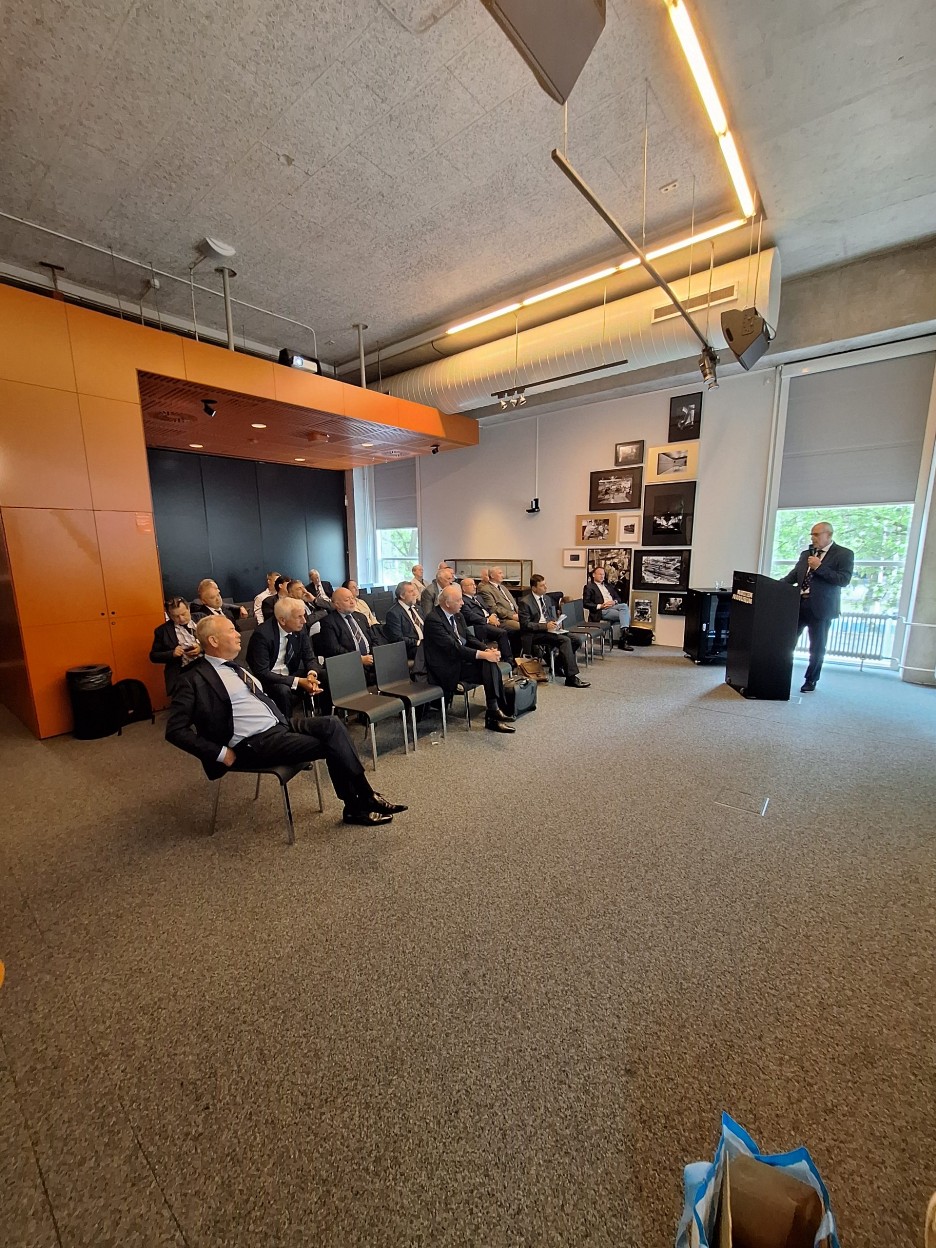
ITEM 2: ADOPTION OF THE AGENDA
The Agenda is presented by the Secretary General Capt. ARDILLON, and it is decided after adaption of minutes of last year AGA to go on the resolutions in order to finalize them.
ITEM 3: ADOPTION OF THE MINUTES OF THE 28TH AGA (VARNA)
Capt. DIMITROV reminds the audience that the Minutes of 28th AGA had been published in CESMA Newsletter, and agreed by the member associations. He asks for any amendments or corrections, none being issued, minutes are adopted.
ITEM 4: REVIEW OF RESOLUTIONS
Secretary General Capt. ARDILLON shows the resolutions as there were adopted at the end of the Council, with some paragraphs to finalize. After wording discussions, resolutions are adopted.
ITEM 5: MATTERS DISCUSSED
Red Sea – Position of Shipmasters
The presentation in the morning was clear on the right for a shipmaster to refuse to enter in the war zone. The problem remaining to shipmaster is the explanation to give for such a decision. In fact there could not be any proof that the decision (to not proceed in the war area) is the good one. And we cannot exclude the pressure on the shipmaster to enter in the area. Knowing that if nothing happens, it was the good decision and so why shipmaster wants to go contrary of managers’ decision, but in case something bad happens during the transit, it will be the fault of the shipmaster, as he has the power of overriding decision. 10 Galaxy Leader
Crew of the Galaxy Leader is still hostage in Yemen. The master of the vessel is Bulgarian. Bulgarian Association follows the case, and it is noted that the family of the shipmaster asks to not speak too much about, because there is a diplomatic work being done for releasing the hostage.
CESMA could write a letter to EU Commission to push for diplomatic works in order to release the crew.
Maritime Single Window (MSW)
As it was mentioned during the seminar in the morning, the MSW is working better and better. However, it appears that such documents are not published on MSW, such as Bills of Lading. To publish them might also clarify the communication with the MRCC when declaring dangerous goods. This could be of great interest for safety purpose, as it was mentioned this morning in the presentation about the fire on vessels having EVs on board, by knowing the exact situation such EVs have in the vessel.
Digitalisation
Some duties have to be recorded in two ways: digitally but also on a log book, which means double work for captain. Members hope that this is only for a transitional period.
One Member speaks about problem generated by digitalisation: during an inspection, the ISM computer was under a scheduled maintenance plan from shore, the captain should call a sister ship (for which the maintenance was already carried out) to send a copy of the ISM to be presented to the inspector. This underlines the problem of free access to computers on board from shore without asking authorisation to the vessel. The possibility to access computer on board directly could also be a problem of cyber security.
It is also reported that there are too many different systems on board vessels, and the difficulties to be familiarized with all systems. To change vessel needs not only familiarization but learning of new equipment. Also it is necessary to know if the Portable Pilot Unit (PPU) is approved or not with the equipment on board.
Russian Shadow Black Fleet
Our colleagues from Helsinki Shipmaster Association, Finland, reported by mail that the problem with the presence of the black fleet of tankers in Baltic Sea and Gulf of Finland is still pregnant. There are more and more old tankers and this year there are been two serious near miss situations in the Great Belt with these tankers.
Black Sea
As per previous years, since the beginning of the war between Ukraine and Russia, there are a lot of breakdowns of GPS signal in the Black Sea. However there are almost no complaint because that happens every day.
CRIMINALIZATION OF SEAFARERS – PRESENT SITUATION
As during the Council the day before, the case of the Croatian captain is reported. The captain is now in prison in Turkey since seven (7) months for drugs found on board, in cargo holds. The Split Association in which the captain is member is in close contact with him.
Dali at Baltimore
It is reported that even if no one of the crew, including captain, is today accused, the entire crew is on board the Dali, at anchorage, with no possibility for going ashore, and all the personal mobile phones were taken ashore officially for the investigation.
NEXT AGA INVITATION
It is reminded to all Members that in 2025, it is intended to organize the 30th AGA at Lisbon. Secretary General is required to send a letter to EMSA to ask for authorisation to hold AGA in EMSA premises.
Dates will be confirmed, and informed to all Members, as soon as the exact locations will be known.
CLOSURE BY THE PRESIDENT
President Capt. Dimitar DIMITROV closed the 29th CESMA Annual General Assembly and thanks the Netherlands NVKK, especially Capt AMMERLAAN and VAN DEN ENDE for the organisation and the hospitality.
Capt. Dimitar DIMITROV Capt. Hubert ARDILLON P
President Secretary General
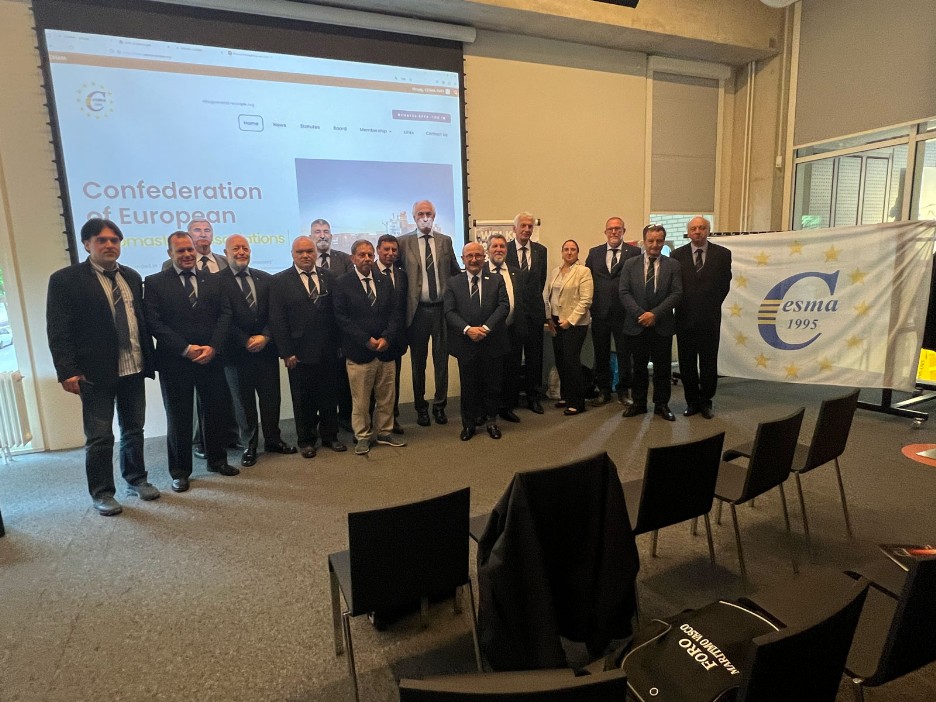
29th CESMA RESOLUTIONS
CESMA members attending CESMA 29thAGA noted with concern the following seafarers’ problems: Wars in Ukraine and Gaza consequences such as attacks on merchant ships in the Red Sea, Gulf of Aden, Arabian Gulf, and Northern part of Indian Ocean accompanied by capturing ships and taking crew as hostages,shortage of European Union (EU) officersand still actual difficulties to obtain visas for non EU seafarers, piracy,safety of ro-ro, ropax and cruise ships, refugees in theMediterranean and the English Channel, mooring accidents involving approved equipment. It was also noted the different practices insimulator training in EU countries, the excessive paperwork on board commercial ships and relatedproblems with fatigue and minimum safe manning requirements, the decrease of traditional navigationalskills, the minimum requirements for seaand port pilots in some European countries, the development of Maritime Autonomous Surface Ships (MASS), the shipmasters key role in navigating the ship in VTS control areas, and the continued accidents with Very Large Vessels.CESMA draws the following resolutions as being of primary importance for shipmasters.
Resolution1: Red Sea and Gulf of Aden
The Assembly, having noted the risks and dangers to proceed in Gulf of Aden, Red Sea, Arabian Gulf and Northern part of Indian Ocean and considering also that merchant vessels are not equipped, even when security guards on board, to react to an attack by missile or drone, asks EU Commission of Transport and EU States Flag Authorities to do all possible to ensure safe passage in these waters. It also asks European Owners to not require their vessels to transit via such areas till the conflict is terminated and areas being considered as fully safe for navigation. The Assembly also urges EU diplomatic and military bodies to do all possible to return EU seafarers taken as hostage back home.
Resolution2: Crew member visas
The Assembly, considering the difficulties to provide crew visas to non-EU Seafarers joining and leaving their vessels when in the EU, and in order to observe and recognize MLC (Maritime Labour Convention 2006), urges EU States Authorities to recognize the seafarer’s entitlement to repatriation under seafarers employment agreements. Consideration be given to create such a visa in the similar manner to that of the combination C1/D visa being issued by the US state department, Crewmember Visa.
Resolution3: Transport of Lithium-ion Batteries and Electric Vehicles (EVs)
Following the numerous fire incidents attributed to sudden self ignition of lithium-ion batteries reported on vessels, and the associated risks to seafarers, the Assembly requires urgently to EU Commission of Transport, jointly with EU States Politics and Industrials, to cooperate with International Organizations, such as IMO, to regulate the transport of such batteries, especially in EVs. In mean time there are available guidelines from EMSA and Classification Societies; and Assembly encourages all parties involved in shipping and transport of EVs to use them as guidance when developing and implementing internal procedures for transporting EVs and other AFVs (alternative fuel vehicles).
Resolution4: STCW documentation and certification
The Assembly notes the process of revision of STCW and urges EU institutions to intervene the amendments proposed to be in favor of seafarers.
CESMA encourages the EU Commission to address the recognition of International STCW qualifications to allow for EU course attendances, which could reduce the number of false certificates.
Resolution5:European Seafarers
CESMA urges EU institutions to adopt programs that support maritime professions to attract and to retain European Seafarers. European policy should be harmonized on education, including new fuels and green shipping, employment of cadets, ship / shore and ship type mobility. The improvement of mental health and wellbeing of seafarers is one of the solutions to attract and retain Young EU Seafarers.
Resolution 6: Criminalisation of shipmasters.
The Assembly acknowledges that the issue of criminalizing seafarers, especially shipmasters, remains a significant concern. To address this, CESMA recommends that captains obtain their own legal insurance to protect themselves in case of any incidents while serving on ships. Additionally, CESMA recommends ship owners and/or operators to always provide legal assistance to shipmasters who are detained by local authorities due to an incident, until a final verdict is reached. The Assembly is also aware of the growing commercial pressures faced by shipmasters.
Capt. D. DIMITROV Capt. H. ARDILLON
President Secretary Greneral
24th May 2024
LETTER RECEIVED FROM EU COMMISSION
Sub: War & High Risk Areas
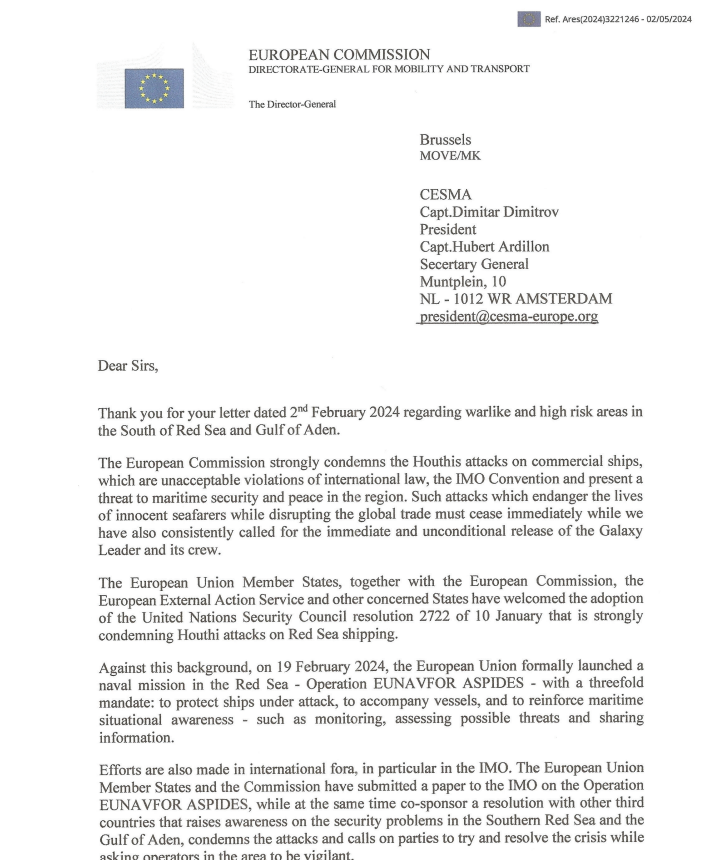
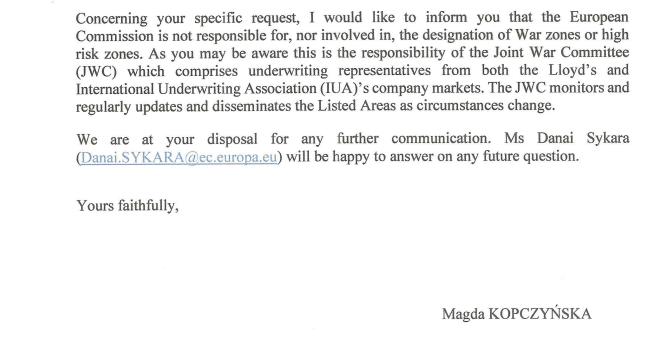
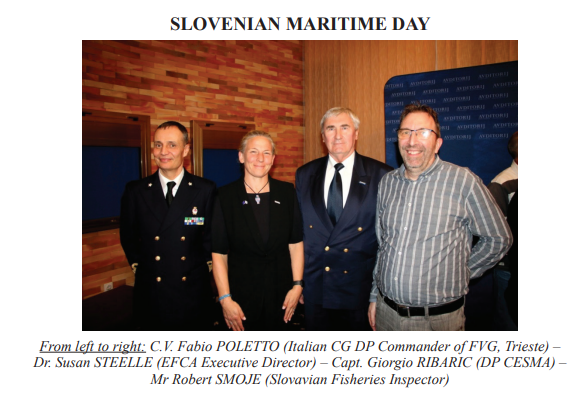
In 1991, Slovenian parlament decided that March 07th will be the Slovenian Maritime Day.
Every year on mentioned day the Ministry of Infrastructure and the Matitime Administration organise the celebration.
Most of the times the celebration takes place in Portoroz Auditorium, as it was this year.
Host of the event was the Director of Maritime Administration M.Sc. in Maritime Studies Jadran KLINEC.
The keynote speaker was Minister of Infastructure M.Sc. Alenka BRATUSEK.
We have the honor that just this days was visiting Slovenian Dr. Susan STEELE – EFCA Executive Director which was present on the event and addressed those present with her speach.
Between the invited guest was Capt. TULLIACH – CTPC Trieste (IT), Italian CG DP Commander of FVG, Trieste CG Office, C.V. (CP) Fabio POLETTO, and other Slovenian guest representing maritime sector and local Municipality Authorities from Piran, Izola and Koper.
After the event I had the oportunity to chat with Dr. Susan STEELE – EFCA Eecutive Director.
Capt. Giorgio RIBARIC
Deputy President CESMA
French MAIB (BEAmer) Annual Meeting
Paris, 20th March 2024
Two Captains of AFCAN (Capt. FX. PIZON and Capt. H. ARDILLON, both vice presidents of AFCAN, went to the annual meeting of BEA mer (French MAIB) at La Défense, Paris on 20th March 2024. After a few welcoming words, it was first Mr Eric BANEL, Director General of Maritmime Affairs (DGAMPA), who spoke. We cannot talk about security without having a global vision, a global vision which necessarily includes the renewal of the fleet, particularly for the fishing sector. Maritime safety is a long-term job: fleets, behavior and training. Training is the heart of the matter to prevent tomorrow’s accidents. Then Mr François-Xavier RUBIN de CERVENS, Director of the BEA mer, made a retrospective of the year 2023 for the BEA mer. 2023 that is 10,000 notifications received, for 536 retained, among which 294 concern a loss of control (propulsion or steering). 2023 also means, unfortunately, 25 deaths, including 10 in fishing and 2 in commerce, and more than 200 injured
Among the 15 publications since March 2017, we can note that 9 concern shipwrecks, capsizes, groundings or work accidents (including man overboard) of fishing vessels, 3 fires of commercial vessels, 1 collision, 1 grounding and the capsizing of the PVCU CORAIA (PVCU: Pleasure Vessel for Commercial Use). Then Mr Mikael KHELIA, EMSA, cited the EMSA annual report. For EMSA, and therefore European waters and ports, there were 2510 events involving 2701 ships, 6 of which were lost. On a human level, there are 579 injuries, 44 very serious cases and 38 deaths to be deplored. Special operations were carried out in the Bay of Biscay, the northern Adriatic Sea, in the Aegean Sea (with the help of underwater drones), as well as multi-purpose maritime operations in Finnish and Estonian waters.
2023 is also the year of the revision of directives on maritime safety, revision adopted at the end of 2023 with put in force planned for 2027: ● Accident investigation 2009/18/EC – Extension of the scope to include fishing vessels less than 15 m – Strengthening training and operational support to be provided by the European Maritime Safety Agency (EMSA) – Alignment with IMO legislation – Accident investigation authorities will engage in a peer review process (through the PCF – Permanent Cooperation Framework) to improve, learn from each other and perfect their procedures. ● Flag State Directive 2009/21/EC ● Port State Control Directive 2009/16/EC ● Directive on pollution caused by ships 2005/35/EC Mr Ulf KASPERA, Director of the BSU (German Maritime Accident Investigation Office), discussed the loss of containers, lessons from the case of the MSC Zoe, Panama flag, 20,000 TEU container ship, which lost some 342 containers during a storm in the DST Terschelling in the North Sea in January 2019. He returned to the theoretical studies concerning the rolling of the ship, as well as the practical and modeled studies carried out in the hull basin. Main causes: ● Strong rolling movements of the vessel. Due to its design, the ship has very high stability and quickly recovers. The resulting acceleration forces acting on the cargo exceeded the holding force of the tiedown system. ● The crew had no knowledge of the danger on board due to a faulty mechanical inclinometer. ● Container losses were not noted. Contributing factors: ● Shallow waters – contact with the seabed? ● Sea packages on deck ● Tossing of the vessel ● No change of course ● Technical standards not up to date. This is obviously not a unique case, with several ships having lost containers before and subsequently, the record being that of APUS One in the Pacific Ocean with a loss of 1,800 containers. BSU recommendations: ● Mandatory introduction of electronic clinometers – IMO ● Revision of construction and loading standards to reflect the increasing size of container ships – IMO ● Modification of the route through the Wadden Sea – coastal states ● Adaptation of internal directives – Shipowner 17 There are two possible approach routes: near the coast - Terschelling - 22 m deep, and offshore – Friesland and Western Approach - 36 m deep.
Extract from the VTS German Bight warning message: TSS Terschelling – German Bight The following container vessels are in danger of losing containers and touching the seabed during heavy seas and high waves from a north to north-westerly direction: If the wave height exceeds 3.0 meters, container ships must take appropriate measures and, if necessary, alter course to avoid travelling at right angles to the waves direction. If the wave height exceeds 4.0 meters, it is recommended that container ships over 200 meters take the alternative route via the TSS Ostfriesland and German Bight Western Approach. Mr Jorgen ZACHAU, Swedish Investigation Bureau (SHK) made a presentation about M/V Estonia. He recalled that the Estonia, when it was delivered, was not planned to navigate on the high seas, and that it was following a change of shipowner that she was positioned on the crossing which was fatal to her. This means that if it was up to standard for navigation in calm inland waters, she was not up to standard for navigation in open waters and in rough weather. The Estonian Bureau of Investigation requested the Finnish and Swedish authorities, who agreed, to continue investigations into the wreck of the Estonia. By using a drone, ROV type, it was possible to film the hull on the bottom. It was also possible to view a short film taken from the ROV around and inside the wreck. As a conclusion : So far, nothing contradicts the old investigation report of the technical explanation A final investigation was presented by Mr Thomas VANDEVENNE, BEAmer, or rather “how the BEA mer comes to take care of this or that file”. At the beginning there is an alert, in the present case, it concerns the death of a sailor who fell from a longliner during a spinning operation in Antarctica. So one death, body recovered, and armed vessel at the Kerguelen maritime district (French Territory). After evaluation of the event by the on-call investigator, study of the first elements and contact with the shipping company, among other things to know the arrival of the ship in Réunion Island, the Director of the BEAmer decides to open the investigates and then appoints a permanent investigator responsible for the investigation as well as an on-site investigator. The permanent investigator travels to Réunion Island and is ready when the ship arrives to begin the necessary investigations and interviews on board and in the shipping offices. This allows you to learn the technical as well as administrative details of the fishing operation.
For example, it is thus revealed that spinning at night is obligatory, in darkness, during the period between the end of nautical twilight and the beginning of dawn, and by reference to the ephemeris provided by the MNHM. At night, and in particular when setting, ships must adopt lighting having, by its location and intensity, a reduced range not exceeding that necessary to guarantee the safety of personnel and the ship. This is an obligation for the “well-being” of seabirds, as they have the annoying habit of rushing onto the hooks of the lines during the day when they put them in the water. Which is perfectly understandable. But reducing light intensities as much as possible while working in an unstable environment is not likely to improve the work safety of fishing vessel personnel. In addition, we can question the notion of “necessary range” of lighting. Following the investigation, the BEA mer makes recommendations, and only recommendations. To the shipowner: ● To initiate a reflection by consulting the TAAF (French Austral and Antarctic Territories) Administration concerning the possible improvement of the lighting of workstations during delicate phases, while minimizing the impact on the avian population. ● To review the longline setting procedure in order to limit human intervention to the strict minimum. To conclude, Mr François-Xavier RUBIN de CERVENS, Director of BEA mer, once again thanked the audience for his presence.
Capt. Hubert ARDILLON
Secretary General CESMA
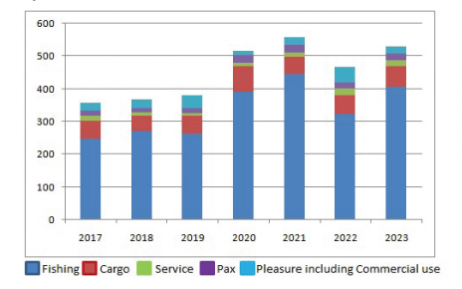
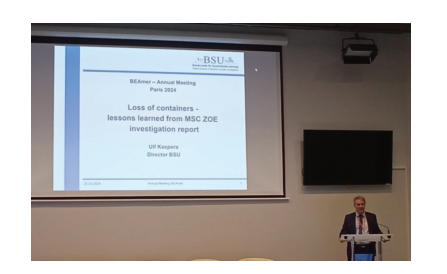
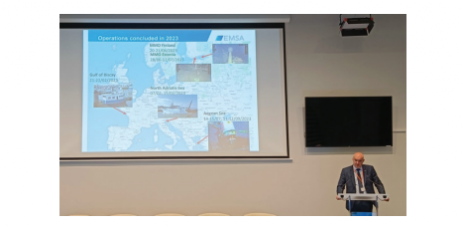
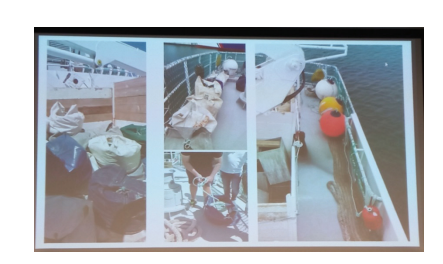
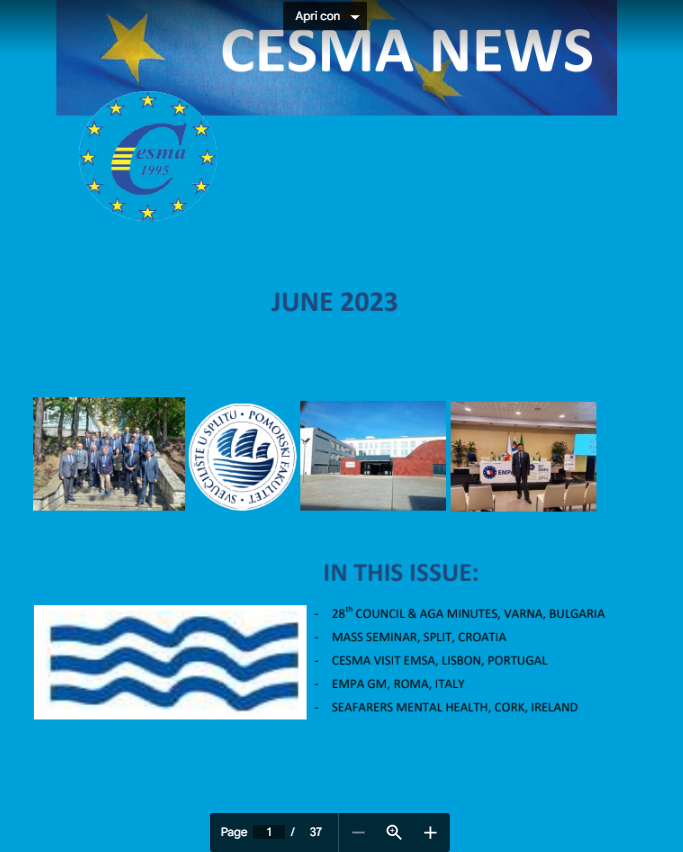
CESMA NEWS
JUNE 2023
CONFEDERATION OF EUROPEAN SHIPMASTERS’ ASSOCIATIONS
SECRETARIAT: MUNTPLEIN 10
NL-1012WR AMSTERDAM
THE NETHERLANDS
Tel.: SEE LIST OF BOARD MEMBERS BELOW
E-mail: info@cesma-europe.org
website: https://www.cesma-europe.org
PRESIDENT: CAPT. D. DIMITROV, BULGARIA
Mob: +359 888 340 160
E-mail: president@cesma-europe.org
private: mitko652012@yahoo.com
DEPUTY PRESIDENT: CAPT. G . RIBARIC, SLOVENIA
Mob: +386 31 375 823
Home: +386 56 772 642
E-mail: deputy.president@cesma-europe.org
private: jrg.ribaric@gmail.com
VICE PRESIDENT: CAPT. M. BADELL, SPAIN
Mob: +34 680 321 138
Home: +34 934 089 288
E-mail: vice.president@cesma-europe.org
private: mariano.badell@gmail.com
SECRETARY-GENERAL: CAPT. H. ARDILLON, FRANC
Mob: +33 609 450 057
Home: +33 235 801 505
E-mail: general.secretary@cesma-europe.org
private: hubert.ardillon@gmail.com
ADMINISTRATOR: CAPT. H. AMMERLAAN, NETHERLAND
Mob: +31 646 260 098
E-mail: administrator@cesma-europe.org
private:h.ammerlaan56@gmail.com
HON. VICE PRESIDENTS: CAPT. R. SERRA †
CAPT. W.VON PRESSENTIN
HON. MEMBERS: CAPT. F.J.V.WIJNEN † CAPT. H.B. BOER †
CAPT. J. CHENNEVIERE † CAPT. J-D. TROYAT
CAPT. G. KIEHNE CAPT. J. JUAN TORRES †
ADVISORS: PROF. J. SPAANS † CAPT. W. MUELLER
Opinions expressed in articles are those of the sources and/or authors only
28th CESMA AGA, 19th MAY 2023, VARNA
OPENING WORDS
Dear Mr Ivailo Marinov, Mayor of District Asparuhovo in Varna,
Dear Flotila Admiral Penev, Deputy Commander of Bulgarian Navy,
Dear Capt. Ivanov, Executive Director of Bulgarian Maritime Administration,
Dear Profеssor Kalin Kalinov, PhD, Vice-rectorNikola Y. Vaptsarov Naval Academy
Dear capt. Dalege, President of European Maritime Pilots Association,
Distinguished guests, dear colleagues,
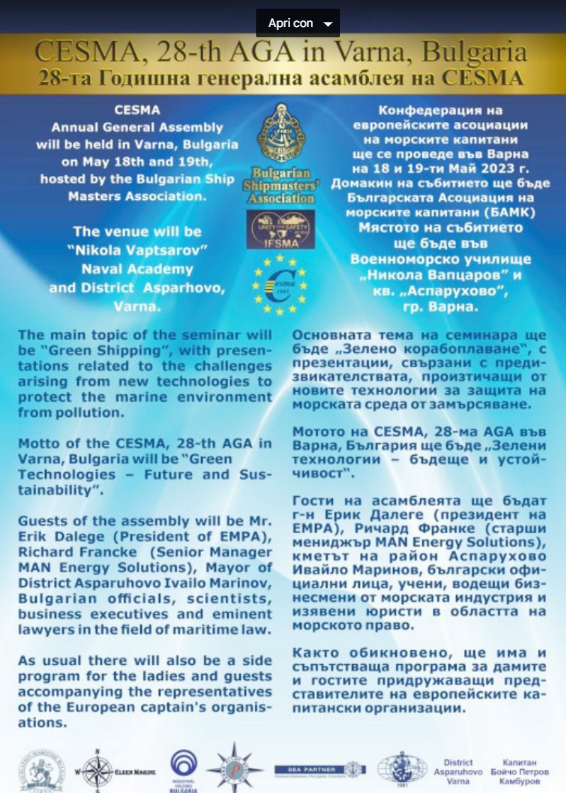
Welcome in the beautiful town of Varna for the 28th CESMA AGA. It was not so long ago,
only 15 years ago when CESMA AGA took place in Varna, Bulgaria in 2008. Since then the Board
changed several times and now we are back to Varna and only two captains are still present from
2008 – Capt. Giorgio Ribaric from ZPU, Slovenia and myself. Special thanks to our host the Naval
Academy for the excellent conditions where we could discuss our issues and to take our decisions.
The situation in the era is still a little bit upset by the near war between Russia and
Ukraine which concerns all the people in Europe and our entire world. We support our Ukrainian
colleagues who are restricted to travel and cannot come back to their country, part of it already
heavily destroyed. At the same time the economic crisis is making the world more volatile and
our future uncertain. In those external conditions ship captains have yet a lot of challenges as
passing dangerous areas like here in the Black Sea, piracy areas like Gulf of Guinea, post COVID
19 consequences where ships’ crew are afraid of going ashore, some companies are yet afraid of
letting the crew to go ashore and that worsens the human wellbeing on board the ships. Alternative
fuels, the green deal and necessity the crew to be prepared to use new fuels, to do bunkering and
to act in emergency situations are other important issues in front of us and we have to be prepared
to do our job.
Our mission to protect professional interest and status of European shipmasters, to promote
maritime safety and security, to develop and retain maritime knowledge and to cooperate together
with European Institutions and IMO should be pillars in our discussions and resolutions coming
out of the AGA.
Yesterday was the International Day of Women in the Maritime Industry declared by IMO.
We have among us Capt. Aine Hyde from Ireland who is acting captain. Let’s congratulate her and
to wish her successful career.
Thanks to all colleagues for coming to participate in our AGA from all parts of Europe and
I hope that we shall have fruitful discussions in the benefit of all European captains. With that I
declare the 28th CESMA AGA open and hope we to take wise decisions which to be in favour of
members of CESMA and all European and worldwide captains.
Capt. Dimitar DIMITROV
CESMA President
28th CESMA COUNCIL MINUTES, 18th MAY, VARNA
Those present:
Captain D. Dimitrov President, BSMA, Bulgaria
Captain G. Ribaric Deputy President, ZPU, Slovenia
Captain M. Badell Serra Vice President, ACCMM, Spain
Captain H. Ardillon Secretary General, AFCAN, France
Captain H. Ammerlaan Administrator, NVKK, Netherlands
Captain D. Lakos Webmaster, ZHUPK, Croatia
Captain I. Conev BSMA, Bulgaria
Captain W.Martens VDKS, Germany
Captain F. Marnika ZHUPK, Croatia
Captain B. Kavanagh IIMM, Ireland
Captain A. Hyde IIMM, Ireland
Captain A. Pels KBZ, Belgium
Captain G. Lettich CNPC, Italy
Captain M. Giannelli USCLAC, Italy
Captain L. Triggiani IYM, Italy
Captain F. Vanoosten HYDROS, France
Captain B. Rusu ACNR, Romania
Captain J. Karnincic ZHUPK, Croatia
Captain B. Vranic ZHUPK, Chartered Master Mariner, Croatia
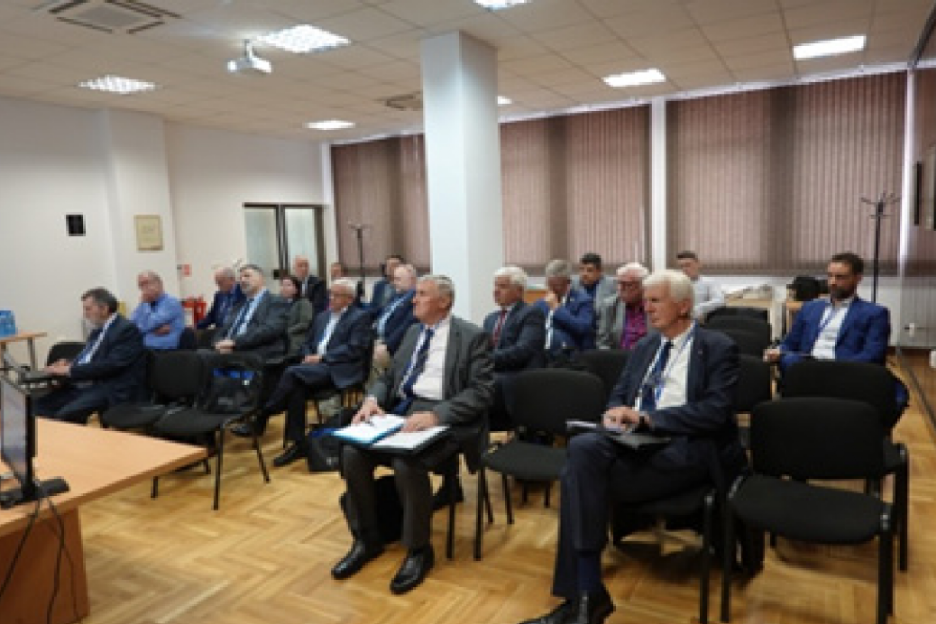
The Council is welcomed by the President of CESMA,
Captain Dimitar Dimitrov.
ITEM 1: OPENING BY THE PRESIDENT
The President, Captain Dimitar DIMITROV opened the 28th CESMA Council Meeting
in the Naval Academy ‘Nikola Vaptsarov’ in Varna. He expressed his thanks about the previous
Council and AGA hold at Genoa, in May 2022, especially to Capt. Marco GIANNELLI who,
assisted by members of USCLAC, made the entire organization. Then President thanks Bulgarian
Captains from BSMA for the organization of present Council and AGA.
Last year Council expressed the necessity CESMA Board could meet EMSA, which was
done last April 2023 at Lisboa by President and Secretary General. The visit gave the opportunity
to President to propose experienced Captains for every CESMA Members Associations to
cooperate with EMSA, by sharing their experience and knowledge on safety of navigation, future
skills of seafarers, safety in use of alternative fuels, maritime spatial planning and other issues of
importance in the maritime industry.
Being in Bulgaria, on the coast of Black Sea, President reaffirmed the CESMA support to
Ukrainian colleagues, informing the Council that a lot of them are already laving in Varna, just to
hear the language spoken in the streets.
President had no doubt that the discussions these two days will be on important subjects for
seafarers and captains.
ITEM 2: APOLOGIES
Apologies are received from Members not able to come, due to work, economic or personal
reasons (Finland-HSF, Portugal-SINCOMAR, Italy-CTPC, Italy IYM).
ITEM 3: PRESENTATION OF COUNCIL MEMBERS
As usual, each council member presents himself and mentions the shipmasters’ association
and which country he represents. We welcome our Romanian colleague (ACNR) Capt. Bogdan
RUSU for first coming to Council and AGA. Also we welcome Capt. Alain PELS who is the new
representative for Belgium KBZ.
ITEM 4: RIJEKA ASSOCIATION APPLICATION
Capt. Hubert ARDILLON, Secretary General, informed the Council that on 1st November
2022, CESMA SG received a message from Juraj KARNINCIC for application of the “Captain
Association of North Adriatic – Queen of the Sea” to be member of CESMA. On 3rd November,
he clarifies the application process:
quote
As it is a new registration, the final decision should be adopted during the next Council,
which means that it will not be necessary to pay the registration for 2023. And in case you are
accepted, the first fee will come in 2024. Even if you would be able to speak in name of your
organisation at the next AGA.
Pse could you refer to CESMA Statutes – article 7 (as below) – and provide, if any, an
english version of your Statutes and By-Laws. I think you have already same from CESMA, if not
it will be a pleasure to send you.
Article 7 APPLICATION FOR MEMBERSHIP
a) The agreement for membership of those associations which, or individual members who,
comply with the provisions of Article 6, will be granted by the Council on basis of a positive vote
of two/thirds of its members after they have verified the applicant’s willingness to comply with the
Statutes and By-Laws.
b) The following information will be provided by the association applying for full membership
or associated membership:
– Number of seagoing, shore based or retired shipmasters and other members.
– Names of the president, vice president, treasurer and general secretary.
– The board of the organisation is entitled to ask for the submission of an English translation
of the Statutes and By-Laws of the applicant association.
Statutes were received on 18th November.
However it seems that, at least for 2023, the Rijeka Association paid fees to the Croatian
general Association, ZHUPK, and by this is automatically member of CESMA. Also, it appeared
that ZHUPK was not aware of this application.
And as to be independent member, it is necessary that Rijeka Association be independent
from Croatian Association, for the Board Members, this affair should be first cleared by ZHUPK.
And in case Rijeka Association would still like to be independent, then:
– There should be an agreement from ZHUPK
– There should NOT be any fees paid by Rijeka to ZHUPK
– And so, CESMA Council can proceed to a vote for application of Rijeka Association to be
member of CESMA.
– But our statutes say: one country = one voice. Which means that ZHUPK and Rijeka would
have half a voice each, or that they will make a deal in order to have a join vote.
unquote
Then during the discussion, it appears that it is not yet clear as North Adriatic Association
has paid yearly subscription to ZHUPK, meaning that such Association is still member of ZHUPK,
as per the six others Croatian Association. Even during the discussion in Council, North Adriatic
asked to be member of CESMA. And after questioning, Capt. Juraj KARNINCIC confirmed that
North Adriatic Association is still member of ZHUPK. It was then answered that till the “separation”
of North Adriatic from ZHUPK is not cleared, such application could not be accepted.
It is then required to ZHUPK and North Adriatic to clear first the situation internally before
to be able to send an application of North Adriatic to CESMA. And in any case if North Adriatic
is still member of ZHUPK, it cannot be independent member of CESMA.
During the discussion, it was also noted that ZHUPK which means Union of Croatian
ShipMaster Associations, it could be legally difficult to accept a new Croatian Association in its
name, Country Croatia being already member of CESMA.
ITEM 5: ADOPTION OF THE AGENDA
The agenda was adopted with a modification, items 11 and 12 being reversed.
ITEM6: ADOPTION OF THE MINUTES OF THE 27TH COUNCIL, GENOA
ON 5TH MAY, 2022.
Captain DIMITROV, CESMA President informed the floor that the minutes of 27th Council
Meeting had been agreed after the event and already published in CESMA Newsletter. It was sent
lso by Secretary General several weeks before actual Council. No remark had been reported and
the minutes had been adopted unanimously.
ITEM 7: RENDERING OF THE 2022 FINANCIAL PAPERS.
The financial papers were presented by Secretary General.
Income: One Association (LCC, Lithuania) did not pay subscriptions for 2022, and it is for
the second consecutive year.
Expenditure: 2022 we paid only half of office rent in Amsterdam, due to an oversight from
KCZ. The situation is now solved, and in 2023, we will pay for 1.5 year. Travel Board expenses
were just more than half of what was budgeted. However beginning of 2022 was still impacted b
the pandemic. Meetings are coming back to normal now, even if it was kept from pandemic that
every meeting can be performed either by presence or on video.
News letter: few more than budgeted, and the budget for this post is increased by 200 Euros
to comply with the costs from printing company and stamps.
Except CESMA Newsletter post, the budgets for 2023 and 2024 are kept at the same level
than previous year.
To conclude the financial papers had been adopted.
ITEM 8: SECRETARY GENERAL’S REPORT
Captain ARDILLON presented the Secretary General’s Report which gives the activities of
CESMA in the year 2022.
2022 was still impacted by the virus. As already said while presenting Financial papers,
we have still meetings hold on internet. And most probably, this is a consequence of the Covid
pandemic, a lot of conferences or seminars are and will be done on site but also on internet. Some
time, it could better to follow on internet, as we are so able to follow a conference, to ask questions,
directly from home. But of course for the contacts we could have face to face with authorities and
shipping deciders, it is less comfortable.
Main questions are concerning skills to be delivered to seafarers: green shipping, cyber
security. But also about the news fuels, even if the subject is still on expectation, as safety and
operating procedures need to be think about.
However the conferences or discussions we were participating this year were also about a
main subject: wellbeing of seafarers. Even if the subject is not really new, this is also probably a
consequence of the pandemic. We complained during the pandemic that the seafarers were totally
forgotten, which was true. But as there is a large miss of seafarers in the world and mainly in
Europe, the question “how to attract youth to become seafarer” is strongly related to the wellbeing
at work. The subject is also in relation with the war in Ukraine. Ukrainian and Russian seafarers
represent a large percentage of world seafarers. And of course, they are less now allowed to join a
merchant vessel, whatever be her flag.
So more need of seafarers, less on the market, consequence is to attract young
seafarers, youth is more connected with shore, more strict on the condition of employment,
also more involved in the earth protection. The consequence is that skills are very important,
and Wellbeing or wellness too of course.
We were so able to participate “in presence” to some conferences. Let see the CESMA l logbook for 2022. Unfortunately we were not able to meet the EU Commission or Organisation,
nor EU Parliamentarians. At least for 2023, we already met mid April EMSA in the Lisbon
headquarters.
I would like here to express my thanks to some of our Associations, and it is still the case in
2023, which organize a conference or seminar. And second thanks when they send to CESMA a
report for to be edited in the CESMA Newsletter. It is important to do so, because it shows to the
ESMA Newsletter readers that we are participating to conferences and able to give our thoughts.
And, why not, it could also give one idea to another Association. Subjects are on the table: green
shipping, cyber security, news fuels, safety on board and in port, navigation and unmanned vessels.
ITEM 9: INTERNET SITE
Site cesma-europe.org is working well. We have to publish more articles to show what
CESMA is doing. Old site cesma-eu.org should be deleted before 26th September, Secretary
General being in relation with hoisting company.
The email addresses associated for Board Members are all used. It is proposed for
Associations which would like to have an email address (associationname@cesma-europe.org)
in order to send and/or receive messages related to CESMA. It is proposed to delete the address
cesma-eu@introweb.nl in the forthcoming year.
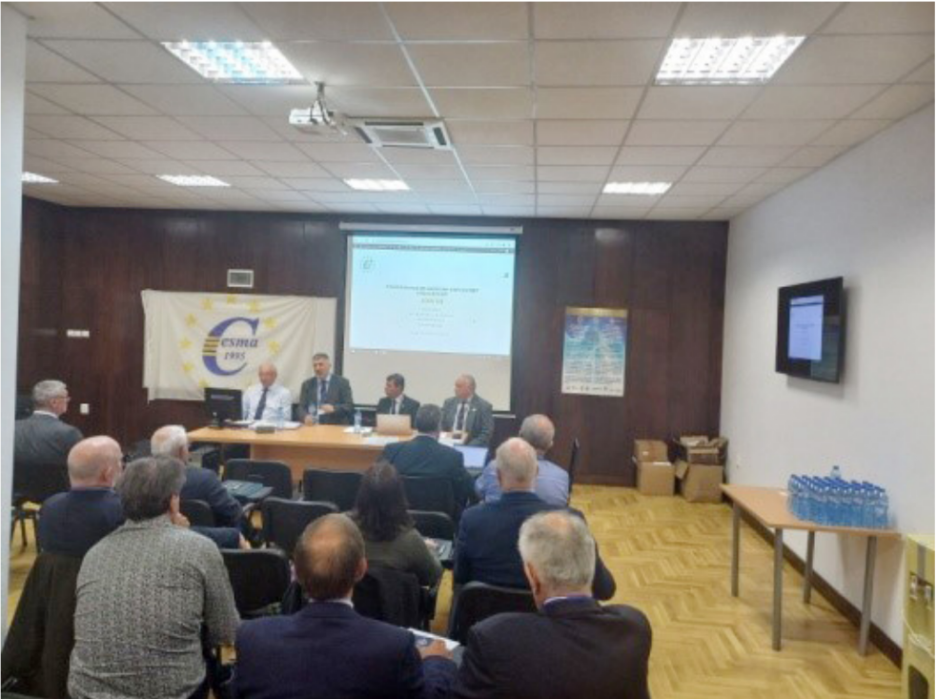
ITEM 10: STATUTES AND BY-LAWS
There were no proposals of modifications.
ITEM 12: CESMA BOARD
On 4 members, 3 were elected in 2021 and one in 2020. The fifth member of the Board
(Administrator) being automatically the one from NVKK due to the fact CESMA is registered in
the Chamber of Commerce of Amsterdam is not elected.
As each time there is a change in the composition of the Board, Administrator has to take
all steps with Netherlands Administration, it is proposed that this year, normal renewal year for
Vice President, same could be extend by one year in order to have next year a vote for full renewal
of Board. Proposition was accepted unanimously.
ITEM 11: MEMBERSHIP
It becomes quite urgent to contact our colleagues from Lithuania and Latvia that are not with
us today and same for the two last years. It might be possible to meet at the same time/voyage the
Polish Association of Shipmasters
If we look at the first page of CESMA Newsletter, composition of the Board and particularly
the paragraph “Advisors”, on the two names, only one is still alive, but without any contact during
last years. President Capt. Dimitar DIMITROV proposed to look at for new advisors. To do so it
is asked to Associations to propose experienced captains to the Board.
Vice-President Capt. Mariano BADELL informed Council of the new composition of
AVCCMM Board, Bilbao, member of CESMA. It is noted that several women are now part of the
board. Secretary General will contact AVCCMM in order to know the person who will be in charge
of communications with CESMA.
ITEM 13: COOPERATION WITH OTHER ORGANISATIONS.
Secretary General sent invitations to CESMA AGA in Varna to Nautical Institute – unable to
come, but President is in contact even if the date of NI AGA is not really possible for CESMA, to
EMPA – EMPA President will be with us tomorrow for AGA, to IFSMA – with no answers.
ITEM 14/15: RESOLUTIONS (FROM 27TH AGA & NEW PROPOSALS).
Past year resolutions were discussed and amended, new resolutions are proposed by members
to the Council.
See Item 17 “Other Matters” and final resolutions adopted at the end of the AGA Minute
ITEM 16: INVITATION FOR THE NEXT AGA.
Capt. Hans AMMERLAAN from NVKK, The Netherlands, and Board Administrator
proposed next Council and AGA 2024 to be held at Rotterdam, The Netherlands. Dates and places
to be finalized, one of the meetings will probably be in Harbour Office of Rotterdam Port. Proposal
was adopted unanimously. As usual all CESMA Members will be informed in due time with details.
ITEM 17: ANY OTHER MATERS
Capt. Whilelm MARTENS, VDKS Germany, pointed out the problem “How to attract” in
Maritime Sector. Germany and other European Countries need officers on vessels but also in
maritime offices, pilotage and all industries related to Maritime Sector. It should be looked at
astern to understand how the sector came to this situation. As an example, the internet access on
vessels, why is this point still in discussion?
He asked CESMA to focus that point with European Union Commission and Institutions in
order to change the working condition, and so the employment of European seafarers.
As there will be a renewal of European Parliamentarians next year, it is probably the good
period to contact actual ones on that subject.
Capt. Ivan CONEV, BSMA Bulgaria, made a short presentation of the EU EndorseMe
project.
The EndorseMe tool is designed using an easy-to-use database format, to simplify the
search and categorisation of information specifically related to Certificate of Competency (CoC)
recognition. This is geared towards seafarers across all EU member states, and third countries.
The primary objective of this online database tool is to provide accurate and up to date
information, to seafarers, regarding recognition of their CoC status under two categories:
1. EU member state and third country recognition of their certification issued by their national
administration; and
2. Their own national administrations’ recognition of other EU and third country CoC
qualified seafarers.
The platform will have an option to investigate acceptance/endorsement of sea-going
certificates. ENDORSEME project aims to identify the problems associated with recognition/
endorsement of certificates in a questionnaire-based needs analysis and information based on the
investigation of undiscovered areas.
More information can be found on internet: https://endorseme4seas.com
Capt. Giovanni LETTICH, CNPC Italy, came back on the Jolly Nero case with last court
sentences, not executive as waiting from Court of Cassation last decision.
Captain was sentenced to 7 years in jail, Chief Officer to 6 years and Chief Engineer to 4
years.
Capt. Bill KAVANAGH, IIMM Ireland, thanked CESMA for support given to organize in
last October 20225 a seminar on wellbeing of seafarers. The seminar was scheduled for 2020 and
support was given just before the pandemic arose which postponed the seminar till October 2022.
On 18th May, day of the Council, IMO launched the International Day for Women in
Maritime. Council was attended by Capt. Aine HYDE, IIMM Ireland, who is an active captain in
the North Sea Offshore industry.
ITEM 18: CLOSURE BY PRESIDENT
Council was closed after 17:00 by President Dimitar DIMITROV after a very fruitful day of
debates.
EXTRA: After the lunch break, taken in a restaurant near the Naval Academy, Council
members had the opportunity to visit the navigation simulator of the Academy, where there is the
possibility to train navigation on a bridge equipped with a 3D view mean, able to project an avatar
on the bridge.
Captain D. Dimitrov Captain H. Ardillon
President Secretary General
28th CESMA AGA MINUTES
ITEM 1: OPENING BY THE PRESIDENT – PRESENTATION OF
BOARDMEMBERS. AIMS OF CESMA
The Seminar, and then the AGA, was hold in the magnificent Planetarium AGA of the Naval
Academy. Opening words from President Capt. Dimitar DIMITROV, see page 2.
CESMA NEWS
DECEMBER 2022
CONFEDERATION OF EUROPEAN SHIPMASTERS’ ASSOCIATIONS
SECRETARIAT: MUNTPLEIN 10
NL-1012WR AMSTERDAM
THE NETHERLANDS
Tel.: SEE LIST OF BOARD MEMBERS BELOW
e-mail: cesma-eu@introweb.nl
website: https://www.cesma-europe.org
PRESIDENT: CAPT. D. DIMITROV, BULGARIA
MOB : +359 888 340 160
e-mail: president@cesma-europe.org
private: mitko652012@yahoo.com
DEPUTY PRESIDENT: CAPT. G. RIBARIC, SLOVENIA
MOB: +386 31 375 823 Home: +386 56 772 642
e-mail: deputy.president@cesma-europe.org
private: jrg.ribaric@gmail.com
VICE PRESIDENT: CAPT. M. BADELL, SPAIN
MOB: +34 680 321 138 Home: +34 934 089 288
e-mail: vice.president@cesma-europe.org
private: mariano.badell@gmail.com
SECRETARY-GENERAL: CAPT. H. ARDILLON, FRANCE
MOB: +33 609 450 057 Home: +33 235 801 505
e-mail: general.secretary@cesma-europe.org
private: hubert.ardillon@gmail.com
ADMINISTRATOR: CAPT. H. AMMERLAAN, NETHERLAND
MOB: +31 646 260 098
e-mail: administrator@cesma-europe.org
private: h.ammerlaan56@gmail.com
HON. VICE PRESIDENTS: CAPT. R. SERRA †
CAPT. W.VON PRESSENTIN
HON. MEMBERS: CAPT.F.J.V.WIJNEN † CAPT. H.B. BOER †
CAPT. J. CHENNEVIERE † CAPT. J-D. TROYAT
CAPT. G. KIEHNE CAPT. J. JUAN TORRES†
ADVISORS: PROF. J. SPAANS † CAPT. W. MUELLER
Opinions expressed in articles are those of the sources and/or authors only
CESMA WITH ANOTHER CHALLENGING YEAR
Dear colleagues, 2022 is coming to its end with all the positives and negatives for
seafarers and seafaring profession. The world is slowly recovering from the COVID 19
pandemic but with continuing war in Ukraine and incertainity regarding the fuel and gas
supplies we are expecting the new 2023 with moderate optimism. The problems with travel
overseas during pandemic are superseeded by sanctions against Russia and difficulties to
Russian and Ukrainian seafarers to leave their countries and to join ships disturbing ship
manning.
CESMA had excellent AGA in Genova with important decisions and resolutions
taken in favor of EU captains regarding criminalization of seafarers, navigation in VTS
controlled areas and responcibilities to the shipmasters, Ukrainian seafarers certification,
developments of maritime autonomous surface ships, etc. The changes of fuels used in
the world economy and in the maritime transport are challenging our future job at sea. We
need new knowledge about bunkering new fuels, dealing with emergencies and control of
operations with them. CESMA will continue supporting EU shipmasters in their every day
work on board in close cooperation with EU Parliament and Commission, EMSA, EMPA
and all other maritime professional organisations.
Following information from BSMA, host organization of next CESMA AGA in 2023
the dates for the venue are 18th and 19th of May 2023 in the Naval Academy in Varna,
Bulgaria. Information about hotels will be sent to the member organizations in the early
2023.
CESMA Board is happy to wish all CESMA member organizations and all EU
captains Merry Christmas and happy and prosperous 2023 with fair winds and calm
seas, less administrative burden on board the ships and let’s remind what the ancient
people used to say that “Navigare necesse est”, in modern words we have to sail on
board ships in order oranges, electronics, raw materials and all the other goods to be
available everywhere and to reach their destinations smoothly from their places of
origin.
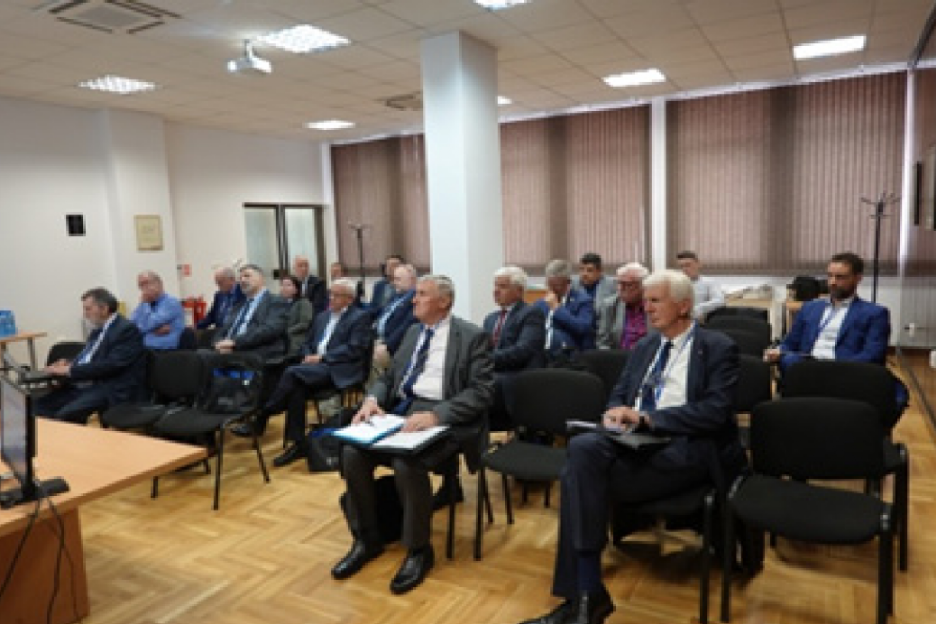
SEAFARERS’ MENTAL HEALTH AND WELLBEING
Since at least one year, CESMA is invited to meetings or seminars whose subject is
the mental health or the wellbeing of seafarers.
It is something nice to see the life of seafarers recognized. Something new also. Not
so far away, even if subjects already exist, they were not on the spot. Not speaking too
much on about.
Why now? Remember during the pandemic, when the seafarers were not recognized
as key workers, or late after some others. Despite the fact that seafarers kept the vessels
sailing, loading, discharging everywhere in the world. But with a lot of constraints:
crew reliefs postponed (to the next possible port, if State gave authorization for reliefs
and transits), extended contracts, shore leave during call forbidden (officially the reason
was to protect the seafarer!), problems for vaccinations, and probably the saddest, the
impossibility of disembarking a deceased crew member. But vessels were still sailing, and
seafarers still working. There were also a numerous suicidal attempts. And probably more
important, at least for the owners and the managers, a considerable number of seafarers did
their last contract during this period. And the already great miss of officers and ratings on
board merchant vessels has increased considerably.
CESMA, as well as other maritime associations has warned the local, State and
European authorities about the life condition of seafarers during the pandemic period. And
maybe, after a lot of mails received from different horizons, the perception of the seafarers
by those authorities has changed. To a better one. It seems this is the good consequence of
the Covid.
Just anecdotes, at the Cork seminar in October, on 13 speakers, 7 were women. This
is also a sign of changes in the maritime world.
So, one is speaking of mental health, well being. This covers different subchapters,
such as welfare, length of contracts, nutrition, sports, fatigue, rest periods, shore leaves,
vibrations, and noise and so on.
More rest, seafarers in a great majority are working in 6/6 shifts. Nutrition, of course
everybody would like to received a better quality of food (and cook also). Vibrations and
noise, solution is just to decrease the sea speed. Individual sports, yes but time is needed
for. Etc. How to obtain that? The answer is simple: more crew, better quality crew.
But there is still one question without any answer. Who will pay for?
And in the same time, the maritime world is also speaking of autonomous vessels,
with no or at least very few crew members. Then is the vessel more or less autonomous and
the seafarers’ wellbeing ready for the same world?
When this December Newsletter will be edited, we will be close to end of 2022
and beginning of 2023. In the name of CESMA, all Board Members would like to wish
Merry Christmas and Happy New Year. May 2023 be a prosperous year for all seafarers,
prosperous, healthy and in peace. AGW, we should meet in Varna for our Annual Council
and General Assembly.
Capt. Hubert ARDILLON
CESMA Secretary General
SEAFARERS’ MENTAL HEALTH SEMINAR
September 16, 2022 in Brussels
The program for the day was: “Seafarers’ Mental Health”, a vast program which
would have deserved more than one day.
After a few words of welcome, Mr Livia Spera, Secretary General of the ETF, gave
the floor to the Secretary General of ECSA, Mr Sotiris Raptis.
He states that the mental health of the crews is a serious threat, that working on board
a vessel requires excellent condition, physical of course, but also mental and psychological.
Mental health is a challenge with many dimensions. We need to understand the risk
factors & continue to implement effective tools in support of seafarers’ mental wellbeing.
Building on the existing cooperation between ECSA and ETF on key topics such as
training, skills, digitalization, bullying and harassment, is key to address these challenges,
For ECSA, improving the well-being of seafarers on board first and foremost requires
training. Improving, again and again, the response of the crew to a problem or crisis
situation allows them to work more confidently, therefore improving the mental health of
the seafarer. And to improve the response of the crew, the only known way is training, tasks
and situations.
Then the representative of the European Commission (Health at Work) recalled
that stress, depression and anxiety existed before the pandemic. But this pandemic has
exacerbated the situation. The Commission is currently preparing legislation to improve
the environment on board and therefore the mental health of seafarers, taking into account
various factors such as isolation, fatigue, harassment. All of these factors are enhanced by
life on board and at sea.
First discussion panel entitled “Seafarers’ mental health: identifying the problem”
Doctor Marcus Oldenburg – Center for Psychosocial Medicine, Hamburg – Germany,
spoke about the psychological risk factors that affect the mental health of seafarers, among
other things more fatigue at work due to overload, due to the reduction of crews which also
led to an increase in the feeling of isolation.
Doctor Rob Verbist, International Maritime Health Association, Antwerp – Belgium,
notes that unfortunately seafarers’ mental health is not looked at during their pre-boarding
visit. Of course, we can then do a follow-up by radio of a psychic problem. But it should
also be noted that there was little or no possibility of medical monitoring at the port during
the pandemic.
Doctor David Lucas, Doctor of Seafarers, Brest – France, noted that 20% of students
have already suffered, and have therefore been affected by it, a traumatic event during their
first contract. This implies that this type of event occurs quite frequently.
For Mr Tim Springett, UK Chamber of Shipping, the mental health of seafarers is
changing. There is never a single cause for the deterioration of a sailor’s mental health.
There are several factors that affect it. And these factors are mostly under the control
of the ship-owner or manager: living conditions, contract, work, isolation. There is not
always the will from the ship-owner to watch, to invest. There are also other factors: the
seafarer’s family conditions and particularities and his remoteness which does not allow
for intervention, even if there are easy access to appropriate services. In addition, we are
more anxious when we can watch the news on the media. This has an impact that has been
very significant during the pandemic.
Of course suicide can be prevented by improving mental health. But first you have to
identify the problems that have been seen by others. You don’t have to “deal with it”.
Questions at the end of this panel:
What were the Psychosocial risks and their effects and impacts by the pandemic to
seafarers? What did we learn from the health Crisis?
The Covid had a negative aspect. The most important is the ease of States to prohibit
relief and shore leaves, followed by the inability of these same States to reauthorize relief
and shore leaves when the situation has improved.
The question is whether lessons have been learned, have Administrations learned?
The next pandemic will respond.
Second panel discussion, entitled “How to protect seafarers: best practices”
Doctor Camille Jego, Coordinator of Crapem, Saint Nazaire – France, returned to
the establishment of Crapem, the meaning of this Center, namely to put in place suicide
prevention tools.
Mrs Léa Scarpel, European Association against Violence Against Women at Work,
Paris – France, spoke about the Association’s support to victims, the training needed in
schools, at all levels (students and teachers), so that these situations disappear. The theme
of violence against women at work is finally taken into account in the agenda of the various
European Committees concerned, which proves that it is finally becoming important.
Then two representatives of ship-owners intervened. They explained that they were
very concerned about the well-being of the seafarers they employed.
(Note: which was expected, given that they were coming to talk)
One of them nevertheless announced that it was planned to pass an interview, or tests,
psychological before the hiring of the seafarer (possibly before his embarkation). Interview
that would determine if the seafarer was going to be contracted and to which position he
would rather be directed!
Questions following the presentations:
How can we protect and support the mental health of Seafarers? How can we
encourage affected seafarers to ask for help and support and make them feel comfortable
about accessing mental health support services?
Answer from Camille Jego: there is no obligation to give your identity, which
facilitates the possibility of hanging up, since the callback is not possible. The psychology
of seafarers is special. On board, everyone has a specific job and organization. A seafarer
who does not work, or no longer works, thinks that his work is left to another, hence a
difficulty in approaching and hanging on at the start of the interview.
The CRAPEM being a specific device for sailors, this is reassuring.
Remarks from DG Move.
Unlimited internet access is an important issue for seafarers and also for families.
Regarding the problem of shore leaves, we don’t know if it’s linked to the pandemic!
Finally, STCW should be revised to include training in psychology.
On this subject, a person from the Maritime School of La Rochelle, France, intervened.
It would be necessary to register education reference courses, in all maritime schools,
and therefore to generalize them. The methods could evolve according to the functions
exercised on board, and of course to provide for continuous training on the subject.
Capt. Hubert ARDILLON
CESMA Secretary General
CESMA PARTICIPATED IN THE WORLD MARITIME DAY AT IMO HEADQUARTERS
On 28th and 29th September 2022 at IMO Headquarters in London, UK IMO-UNEP-
Norway Innovation Forum 2022 took place in person and online on ZOOM, UN TV and
IMO YouTube channel. Moderator was Craig Eason, Editorial Director & Founder, Fathom
World and Master of Ceremony was Jose Matheickal, Chief, Department of Partnerships
and Projects, IMO.
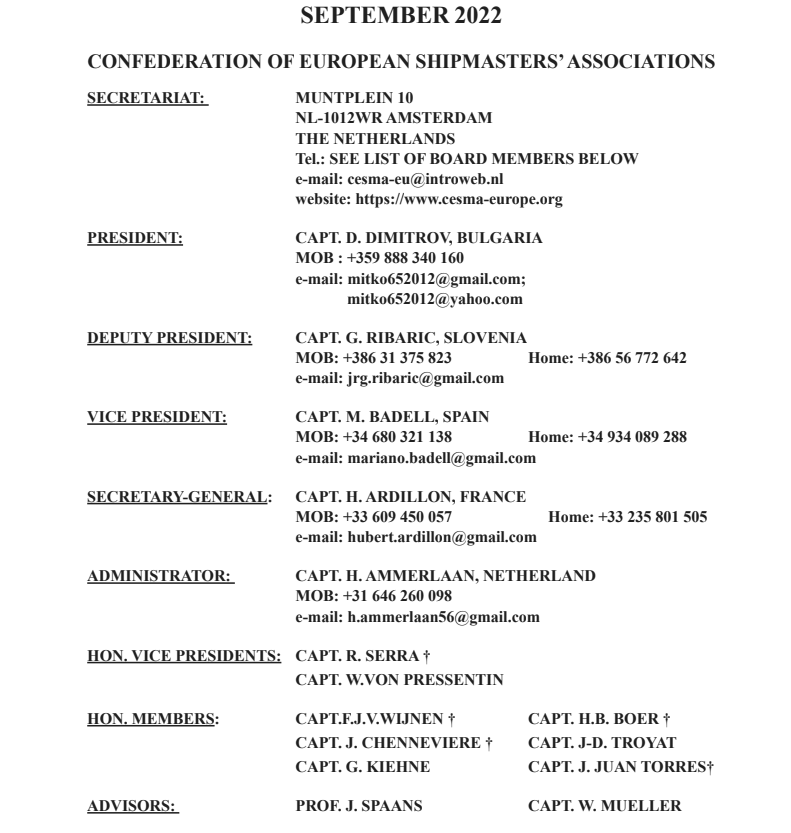
DO WE NEED TRADITIONAL AIDS TO NAVIGATION
Sometimes official events gave us motive and reason to evaluate our professional goals
and to think about the future. World Marine Aids to Navigation Day was celebrated on July 01st,
2022 in Burgas, Bulgaria. Delivering one of the opening speeches an idea came to my mind to
compare and oppose the traditional aids to navigation with the modern ones. One of IALA’s officers
interviewed me based on my suggestions that we have to keep the balance between tradition and
modern technology. We see phase out of the use of paper charts for navigational purposes. More
and more we see ships without any paper charts on board. There are very few ships with official
paper charts but even there we see unofficial use of electronic charts or other electronic means to
navigate safely. Should we completely reject availability of paper charts on board?
My general idea during my interview was that we have to use the modern technology. I
would say we cannot navigate safely today in the congested waters and quickly changed marine
environment without all the modern electronics available on board. We have precised GPS systems
based on satelite data combined with electronic charts and the watch keeping officer is not engaged
in putting lines on the chart, considering the errors when the lines do not coincide. In general seems
more easy today. But it’s not. First of all the ships are getting bigger and bigger. We have ultra large
container ships, giant passenger ships, ultra large oil and ore carriers and their number is increasing
rapidly. Coastal water are full with oil rigs and wind mills. Most of the ports are with the same
dimensions like before and accommodating bigger ships is more and more challenge for the port
operation and the companies delivering services in the port like tug companies, pilots, mooring
gangs. The time for executing a operation like controlling the ship when approaching, time to
make fast the tug, time to send line ashore is shortening and all that requires all the information
to be considered, evaluated and actions to be in time in order sailing in congested waters, coastal
areas and port approaches to be successful. Integrated bridge systems allow the information from
the charts, position fixing systems and radar information to be seen in one screen, so the navigating
officer, captain and pilot to watch in one screen and to get all the information simultaneously
with one glance. At the same time more and more administrative actions become compulsory
distracting the bridge team from their most important task to navigate safely.
In all the above said we can say that doing navigator’s job on board is not becoming easier.
The modern captain, pilot and watch keeping officer should be familiar with available electronic
systems on board ships. In addition we have precise systems in the traffic control centers and
portable pilot units with valuable information. But as the time for reaction is becoming less and
less sometimes captain, pilot and even navigating officer has no time to look at the screens. Then
what is the solution? Constant situational awareness looking at the surrounding environment is
crucial. In that available traditional aids to navigation are very important and for the time being
they cannot be superseded by any electronic systems. They have to be used together with the new
systems and complexed approach is vital for the success of any venture. The balanced approach
is necessary either to bridge team members or to regulatory bodies like IMO and all the parties
controlling the safe operations like classification societies, port and flag state controls, etc.
All traditional aids to navigation and modern technology systems cost money and it’s a matter
of their users to develop and maintain them. As most of the systems are used my multinational
companies and professionals the decision is taken on international basis and requires combined
efforts of all the participants and stakeholders in the industry. Risk assessment and risk evaluation
is becoming more and more important as one accident or incident could disturb one region and
maybe entire world economy. We have most recently the Ever Given case where Suez Canal
was closed for a week and world logistic chain was distorted. Now we face global warming, fall
of the level of the rivers and many more new challenges we have to live with. All that means
more extraordinary situations and new challenges to all the professionals at sea. We have not
to make small savings increasing the risks. That is very important on educational and training
level. The youngsters are concentrating on new and easy to use technologies and systems and
we face sometimes neglect of traditional aids, systems and technics. It’s understandable but in
crucial moments all the means available have to be used to solve the problems arisen. To be able
to do that the marine professionals have to be trained to use either modern or traditional aids and
of course the aids to be available and in good order. Thanks to IALA we have support to both
modern and traditional aids to navigation. I really appreciate the classic lighthouses with their
architecture and beauty. They are expensive to be maintained but they are priceless in many critical
situations. One good example is the lighthouse Sveta Anastasiya in Burgas, Bulgaria. The territory
of the island was abandoned many years and the lighthouse was maintained by the Navy as all
the other aids to navigation along the Bulgarian coastline. The island was concessioned to the
community of Burgas, the ruined buildings on the island were transferred to touristic attractions
like museum, interactive entertainments for children, restaurant and thus funds could be raised for
maintenance of the important traditional lighthouse assisting navigators during the approach to the
port of Burgas. For tourists the island is chance to learn the old history of the island and the region,
good food and entertainment to the children but for the stakeholders in the maritime industry it is
important means to increase safety.
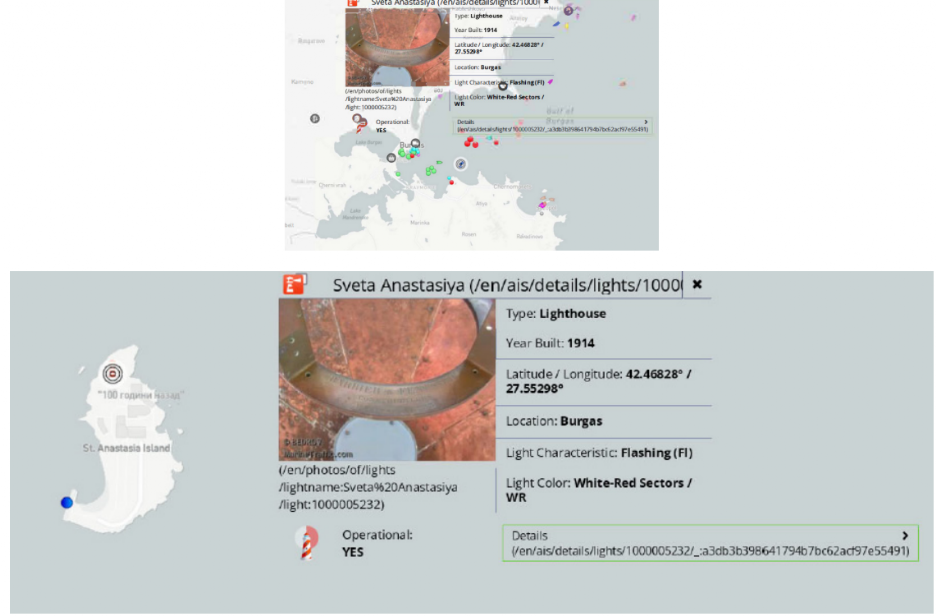
During the celebration of World Aids to Navigation Day 2022 there took place official
ceremony for presenting the Lighthouse of the Year award. It was awarded to the Homigot
Lighthouse in Pohang, with a total height of 26,4 meters, making it the tallest lighthouse in the
Republic of Korea. So, we have good examples of successful management of the traditional aids to
navigation all over the world. We, navigators, captains, pilots, tug masters, watch keeping officers
relied, rely and will rely on those important means for safety of navigation. We have to support
both traditions and modern technology on institutional, regulative, commercial and professional
level for safe, efficient and effective maritme transport.
Capt. Dimitar Dimitrov, PHD, FNI, Pilot in the port of Varna, Bulgaria
President
CESMA IN THE WORLD MARINE AIDS TO NAVIGATION DAY 2022,
ON 1ST JULY, BURGAS, BULGARIA
World Marine Aids to Navigation Day was celebrated on July 01st, 2022 in Burgas, Bulgaria,
hosted by Bulgarian Ports Infrastructure Company. CESMA was represented by Capt. Dimitar
Dimitrov, PHD, FNI, and President of CESMA during the conference and acompaning events.

World Marine Aids to Navigation Day (WAtoN Day) is celebrated every year on the 1st of
July and is organized by International Association of Marine Aids to Navigation and Lighthouse
Authorities (IALA) and hosted by member states of IALA.The principal objective is to promote
greater awareness of IALA and its work by bringing to the attention of the wider public the role of
Marine Aids to Navigation and the significance of IALA’s technical work in enhancing the safety of
navigation worldwide. In 2022 the event took place in Burgas after two years of on line celebration
due to COVID-19 pandemic. The event began with a nice presentation of youg Bulgarian girl
reading a fairy story about a sailor saved by the Burgas lighthouse opened for operation in 1899.
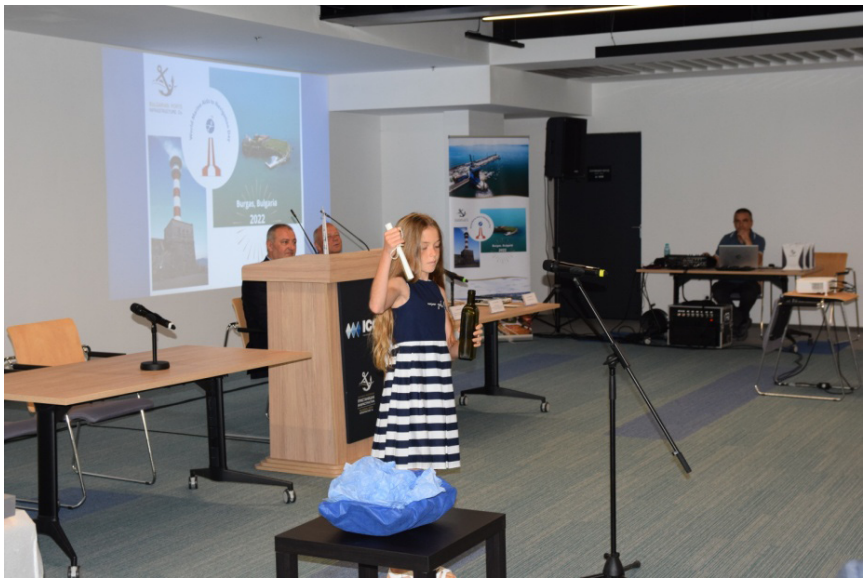
The opening speeches were delivered by Capt. Milen Todorov, Head of Bulgarian Vessel
Traffic Management and Information Services, Mr Francis Zachariae, Secretary-General of the
International Association of Marine Aids to Navigation and Lighthouse Authorities (IALA),
Commander Vanio Musinski Head of department in the Bulgarian Navy and Capt. Dimitar
Dimitrov, President of CESMA and IMO Goodwill Maritime Ambassador for Bulgaria.
The conference, which was part of the prestigious event, gathered together marine experts
from the UK, Belgium, Spain, France, Iceland, Republic of Korea and began with the presentation
of Capt. Milen Todorov, Director of Vessel Traffic Services Authority, BPI Co.: “Manageme
Information Services and Provision of Navigational Safety in the Maritime Spaces and Ports of
Bulgaria – Systems, Innovation and Future”. The presentation is available in the web page of
BPIC <http://www.bgports.bg/bg/page/81>. Detailed information for the Aids to navigation and
VTS Service in Bulgarian coastline was presented together with the latest developments of the
information services connected with safety of navigation. The below slides explain the role of VTS
in favor of shipmasters sailing in Bulgarian coastal waters.

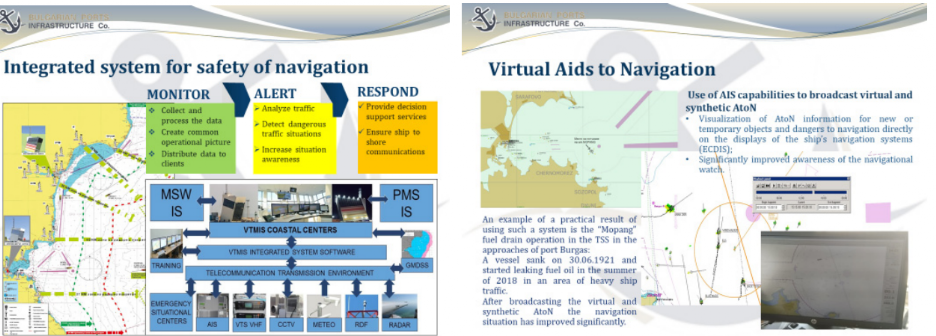
In the new trends artificial inteligence is used to assist navigators in congested areas and to
provide them with information and suggestions in solving the problems of passage planning and
execution.
Lt Cdr Nikolay Lyaskovski, Assistant Director of Bulgarian Navy Hydrographic Service,
presented “Opportunities for modernization of the Aids to Navigation at the Bulgarian Navy
Hydrographic Service”. As per national law the Bulgarian Navy is responcible for maintaining
aids to navigation and admiralty charts in Bulgarian waters.
The conference continued with presentations of Mr Minsu Jeon, Technical Operation
Manager (IALA), on IALA activities and plans and Mr Omar Eriksson, Dean of the World-wide
Academy and Deputy Secretary General (IALA), on the activities of the World-wide Academy.
The main goal of IALA is to establish and coordinate world standard for aids to navigation and the
objective of the Academy is to develop and promote the use of the IALA model training courses.
The event included an official ceremony for the awarding of the Lighthouse of the Year
award. It was awarded to the Homigot Lighthouse in Pohang, with a total height of 26.4 meters,
making it the tallest lighthouse in the Republic of Korea.
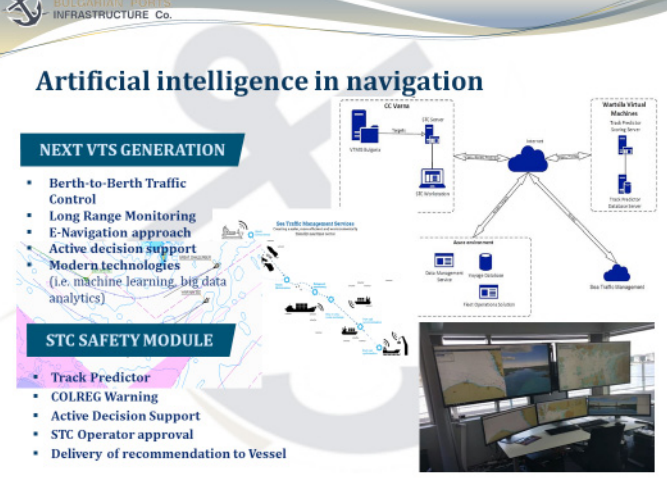
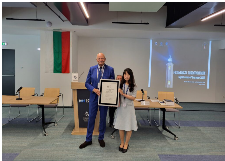
The participants of the conference saw the very nice exhibition “Lighthouses and other
means of navigation support on the Bulgarian Black Sea coast”in the lobby of the congress center,
then they were taken to Burgas VTS tower where they were acquainted with newest technologies
used to observe, control and manage the traffic. The lunch was in the small island St. Anastasia in
the bay of Burgas where all attendees were able to get acquainted with the exciting history of the
island and to visit the local lighthouse.
Captain Dimitar Dimitrov
President
III INTERNATIONAL CONGRESS BILBAO – 17th to19th May 2022
500 YEARS OF THE FIRST ROUND THE WORLD
Organized by our colleagues from the AVCCMM (Asociacion Viscaina de Capitanes de la
Marina Mercante), the CESMA was invited to speak on the last day. Below is a report of all the
presentations we attended as representatives of CESMA (Vice President Captain Mariano Badell
and Secretary General Captain Hubert Ardillon).
Apart from that made by the Secretary General, the presentations are summarized following
the notes taken. The report being a bit long, it will be published in three parts. Not all congress
presentations are reported here, as there were two different rooms running at the same time, and
we chose to follow the ones we thought would be of interest to captains.
Tuesday, May 17th (part 1 on 3)
HISTORY
1- Magellan-Elcano. First trip around the world – 1519-1522
by D. Manuel Sieira Valpuesta, Commercial University of Deusto
First, a few reminders on the historical and maritime situation. Renaissance period (15th and
16th centuries). Known World (Ptolemy Map, Silk Road, Spices Road). Fall of Constantinople,
end of the Byzantine Empire and arrival of the Ottoman Empire. Search for new trade routes.
Maritime expansion of Portugal (African Route – Alcaçovas 1479, African coast, Cape of Good
Hope, India, Moluccas). Discovery of America (Columbus 1492, Treaty of Tordesillas, Meridian
of demarcation between Spain and Portugal). Discovery of the Pacific (Vasco Nuñez de Balboa).
Vessels and equipment
Two types of ships for the high seas: the caravel and the nao. The Magellan expedition
includes 4 naos and 1 caravel – Trinidad (110 tons, captain Magellan), San Antonio (120 tons,
captain Juan de Cartegena), Concepcion (90 tons, captain Gaspar de Quesada – master Juan
Sebastian Elcano), Santiago ( 75 tons, captain Juan Serrano) and Victoria (85 tons, captain Luis
de Mendoza). The five ships form a total crew of 237 men (including only 91 survivors counting
the San Antonio which turned back). Magellan is appointed supreme commodor of the expedition.
The ships are equipped with compass, astrolabe, probe and hourglass. Also charts by
Toscanelli, Juan de la Cosa and Waldseemuller.
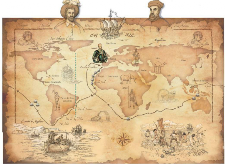
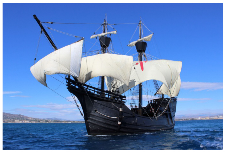
The objectives of the expedition
Magellan, although Portuguese, is “sponsored” by Diego Barbosa on behalf of Carlos I of
Spain (future Emperor Charles V). The instructions received are:
1- Sailing in the Atlantic towards the south coast of the American continent, further south
than the last expedition of Solís (Río de Solís or de la Plata, in 1515)
2- “Seek the strait of these seas” and go to the South Sea to reach the Spice Islands
3- “Not to call or discover land, or anything else within the limits of the Most Serene King
of Portugal, my very dear and beloved uncle and brother, nor to his detriment...”
4- Once in these islands, make “...peace settlement and deal with the king or lord of the
land...”
The supreme objective for Crown of Spain is to resume the trade of the precious spices.
Several hypotheses on the return had been considered before leaving Seville, but no one
gave the order to go around the world, nor indicated how to return to Spain.
Atlantic Ocean
The expedition left Seville on August 10, 1519, calling at Sanlucar, then heading to Tenerife
and Brazil. Arrival at the end of December in the bay of Santa Lucia (current Rio de Janeiro),
then sailing to the south after exploring the Rio de la Plata. At the end of March 1520, Magellan
decided to winter in Patagonia in an estuary called San Julian. On April 1, a mutiny broke out
under the leadership of Juan de Cartegena, Luis de Mendoza and Gaspar de Quesada, who doubted
the chances of survival in these regions. Magellan puts down the rebellion, Mendoza is killed,
Quesada executed and Cartagena abandoned. Forty mutineers are pardoned, including Elcano,
Magellan not being able to continue the journey if a fifth of the crews is executed.
Strait of Magellan
During the summer, Magellan sends out a reconnaissance ship in the passage to the Pacific
Ocean. The recognition lasts more than a month. The Santiago runs aground and is abandoned. The
pilot of the San Antonio rebels and puts his captain in irons and decides to return to Seville, with
all his food, where he arrives on May 6, 1521.
Pacific Ocean
After going out into the Pacific, Magellan sailed up the Chilean coast under various storms,
then the calm returned turned west. The situation is almost desperate, no more water, no more
food, arrival of scurvy which would have caused only 9 deaths, probably thanks to the wild celery
harvested in the strait. Finally arrived at “the island of thieves” (current Guam) on March 6, 1521
where a supply is possible and sailing to Cebu where its king converts to Christianity. But the
island of Mactan refuses to submit, a conflict breaks out and Magellan is killed by a poisoned
arrow on April 27, 1521. Following this, on May 1, the king of Cebu ambushed the officers of the
ships and made them all kill, except two who manage to join the ships at anchor. There are only
113 men left for three ships. Taking on water, the Concepcion is burned in front of Bohol. The
Victoria and the Trinidad arrive in Borneo in mid-July then head for the Spice Islands, Tidore in
the Moluccas. After taking provisions and loading, the two remaining ships sailed, but the Trinidad
took on water in turn and remained for repairs. There then remained the Victoria, with 60 men on
board, under the command of Elcano who left Tidore on December 21, 1521 towards the Cape of
Good Hope, which they doubled on May 19, 1522.
Back to Spain
After calling for supplies in the Cape Verde Islands, a Portuguese possession where twelve
men were to be held prisoner, the Victoria, under the command of Elcano, reached Sanlucar on
September 6, 1522, thus completing the first circumnavigation of the globe.
2- Juan Sebastian Elcano, the sailor, the man, the leader
by Dr.D. Daniel Zulaika, Doctor of medecine, Advisory Committee of Elkano 500 fundation
Elcano’s words still resonate in our ears: “... and moreover Your Majesty will know that what
we must esteem and have the most is that we have discovered and traveled all the roundness of the
world, that in going west we have returned to the east.”
It is not by chance that Juan Sébastian completed the first circumnavigation of the globe.
Native of Getaria, he learned very early the art of sailing and the command of men.
Sailor, entrepreneur and merchant
In Getaria, a town of 1,700 inhabitants overlooking the Bay of Biscay, there are sailors,
but also an economic and social network of several centuries (merchants, transporters, investors,
insurance companies, shipyards, etc.). He is part of a family of sailors and merchants. As for
Juan Sébastian, of whom there is no portrait, he took part in various acts of war in the Levant
(Italy) and in North Africa in his youth with a 200-ton ship acquired by loan from Savoyard
merchants, the guarantee being the boat itself. But while the king has not paid him the costs of
his participation in these wars, he must return his ship to foreign lenders, which is then a crime
because the ship could be used as a warship against the country itself. Problematic situation such
that one of the first actions he will do after going around the world is to ask the king for forgiveness.
Another characteristic of Elcano is that he does not give up in the face of adversity. Following this
bankruptcy, he went to Seville and followed the construction of the Victoria in January 1519, as
master. This is the first time his name appears in the maritime records. Then in March, he was
appointed to the Concepción.
Following the continuous clashes between Magellan, Portuguese, and the other captains,
Castilians, an open conflict breaks out. In the Bay of San Julian (Argentinian Patagonia), on April
1, 1520, Juan Sebastian took an active part in the mutiny. Magellan crushes the rebellion and
condemns 40 mutineers to death and spares most of them, including Elcano who is demoted to
sailor on the Victoria and condemned to hard labor, this during the five winter months spent in San
Julian, and probably until death from Magellan to the Philippines a year later where he resumed
command of the Victoria, with which he arrived in Seville. This incident provides information on
its extraordinary capacity for resistance.
In addition, Elcano is a far-sighted and organized man. After the death of Magellan and the
dismissal of Carvalho, in addition to captain, he was appointed treasurer and accountant of all
goods. From then on, the exchanges with the natives of the islands are recorded in the book of the
accountant and treasurer, which did not happen with Magellan or Carvalho.
Leader
When he is made captain, one of his first acts is to make it clear to the crew where they are
going and what the purpose of the expedition is. Things that both Magellan and Carvalho did
not and which were one of the causes of the mutiny against Magellan. He is also a captain who
consults his men on important decisions. On at least two occasions, he asked the crew’s opinion.
First towards the end of the crossing of the Indian Ocean, when the situation is complicated by
scurvy, leaks, cold and lack of food. Should we dismount in Mozambique (Portuguese possession).
Elcano submits the proposal to a vote and the majority decides to continue without disembarking.
He accepts the decision. Ditto in Cape Verde with a situation so desperate that with a majority
of votes, they decide to disembark with the risk of being captured by the Portuguese. Attitude
that has nothing to do with Magellan’s extremely stiff steering. Elcano is also capable of making
difficult decisions and imposing them when necessary. When the Victoria leaves the Moluccas
Islands alone, the captain and the pilot of the ship, both Greeks, defend the return by the “route
of the Portuguese”, therefore the north of the Indian Ocean, a route better known from a point of
view nautical. However, “the Biscayan captain”, will impose his criteria to take a southern route in
the Indian Ocean, unknown, with unknown winds and currents too. Above all, do not fall into the
hands of the Portuguese, because only they know of the existence of a road, the Strait of Magellan,
to reach the Spice Islands from the west. And if they are captured by the Portuguese, this valuable
information will not reach Seville first.
Elcano’s leadership is particularly evident in his interest in his men. When on arriving at
Sanlúcar he writes to the king to inform him of his arrival, he does not ask favors for himself, but
asks him to intercede with the king of Portugal so that he frees his thirteen men who have were
imprisoned by the Portuguese in Cape Verde.
Elcano therefore has many of the qualities of a modern leader: initiative, ambition, orderly
mind, sense of organization, not giving up when faced with adverse situations, setting clear
objectives, involving employees in decisions, and worry about them. In addition to being a discreet
man, he commands, he is practical, efficient and tenacious. He sets goals and does everything to
achieve them. It is not surprising that he was chosen captain by his men.
Man
Two more intimate sides of his personality can be highlighted: his religiosity and the
relationship with five women who, in one way or another, influenced his life. A deeply religious
man, like the society of his time, a large number of churches, hermitages and hospitals appear in
his will, including ten in Getaria. In addition, when arriving in Seville, the first thing the crew does
is go to the Church of Nuestra Señora de la Victoria in Triana and then to the Cathedral to keep
the promises made in memory of two terrible moments suffered on the way back from Tidore, a
cyclone in the Indonesian seas and a strong storm off the Cape of Good Hope (broken foremast).
In his will, Elcano tries to remedy and make amends for the wrongs he feels he has
committed throughout his life, and then gives us relevant information about five women who had
special meaning for him. First, Mari Hernández de Hernialde, de Getaria and mother of his son
Domingo, his heir. Then her newborn daughter, followed by her mother Maria de Vidaurreta (“for
the liberation of my conscience”). Then he mentions Isabel del Puerto, a cousin. Finally, he quotes
his mother, Catalina del Puerto, naming her universal heiress. This clearly shows the affection and
respect that Juan Sébastian had for her.
3- Elkano and his leadership
by D. Jose Maria Blanco Nunez, Secretary General of the Spanish Commission on Military
History
Leadership considerations
Leadership means “talent of command”, a very old and well-known concept in the Navy.
One exercises command with a “talent” or without, while applying the same laws, regulations, etc.
The captain must make his way of leading (solitude of command) coexist with his “popularity”
(addressing the crew, boosting their morale, favoring initiative and confidence).
Juan Sebastian Elcano
Juan Sebastián Elcano was a fisherman and certainly practiced “smuggling with the ports of
neighboring France”. Thanks to this, he saved the money necessary to buy a ship of two hundred
tons, which he put in the service of the Crown in various campaigns in 1509. Then he joined the
army in Italy, but not receiving the stipulated money, he is ruined, hence the loan from Savoyard
merchants, offering his ship as collateral. Serious crime, as Carlos I reminded him, when he was
pardoned in 1523. He therefore has a criminal record (confiscation of half of his property and
imprisonment) which will weigh heavily thereafter. Despite this, he goes to Seville to see Magellan
who is trying to arm his fleet. He is enlisted as master of the Concepción, for his maneuvering
qualities. In the Atlantic, he remained anonymous until the arrival at the Patagonian port of San
Julián, where the squadron was to spend the winter. There he appears as part of the plot against
Magellan and is known to have readied his ship’s artillery for battle in an attempt to sink Magellan’s
ship Trinidad. Which earned him the death penalty and his immediate pardon, Magellan not being
able to do without men to achieve his goal.
In this analysis of J.S. Elcano’s style of leadership, we can wonder about the existing
relationship between these two characters which, until they arrive in the land of spices, are on
opposite sides. In San Julian, Gonzalo Gómez de Espinosa, the chief usher of the army of Magellan,
goes on order to kill on board the captain of the Victoria. And yet Elcano will keep it afterwards to
fulfill Magellan’s mission.
How did Elcano come to command the Victoria?
Following the death of Magellan, the crews chose Duarte Barbosa, also Portuguese, as
their new captain general, assisted by the Spaniard Juan Rodríguez Serrano. On May Day, King
Humabón of Cebu (converted and baptized) until then an ally of the Spaniards, offers a banquet
to the new commanders of the army with the main officers, except for those recovering from
wounds, such as Pigafetta , and those who are on watch on board, such as Elcano. In the middle of
the banquet, on a signal from Humabón, armed men arrive and kill the Spaniards, except Gonzalo
Gomez de Espinosa and Juan Lopes Carvalho who flee on a skiff. Espinosa puts the Trinidad ready
for battle, Carvalho the Victoria and he orders Juan Sébastian Elcano to prepare the Concepción.
Carvalho takes command and sets sail.
Once calm, the three ships meet and Carvalho is appointed as captain general, on the Trinidad
flagship, Espinosa commands the Victoria and Elcano the Concepción, but the Concepción having
its keel and ribs worm-eaten, Espinosa brings Elcano back on the Victoria as master.
Then after Brunei, Carvalho did not show a great sense of command, seizing Filipino boats
loaded with women and installing a harem on his ship, which shocked the sacred principles of
the Spaniards who immediately dismissed him, appointing Gomez de Espinosa, in command of
Trinidad, and Elcano in command of Victoria. In November 1521, the two ships successfully
reached Tidore, avoiding the Portuguese. By this time almost half of the men embarked at Seville
had been lost.
The return
For the return route, it is necessary to take into account the Indian Ocean monsoon regime,
rainy season and NE wind from November to March (Elcano will leave in December), the coolest
period of the year, and the dry season warmer with SW winds from April to October (Espinosa will
leave in April, but unable to follow Elcano’s wake will attempt the return trip to the East).
The two ships are loaded with spices “to more than freeboard”, in particular cloves and are
preparing to return via the Cape of Good Hope. At this time, the Portuguese were returning via
Cochin and, in fleets, passing between Madagascar and the African coast, with supporting ports in
Mozambique, then ascending via Good Hope.
Unfortunately, the Trinidad takes on water as soon as she sails and returns to the anchorage
where Espinosa has decided to give her some list to seal her off after unloading her cargo. Elcano
will also leave some of its precious cargo waiting for a better opportunity.
The first circumnavigation of the world begins to materialize
Elcano stops at Mutir (or Mare) from where he ships wood to Espinosa and continues to
Timor, seeing hundreds of islands, and after suffering a violent storm (October 1522), they reach
the island of Mallua. At the beginning of December 1522, they brought food to Buru. In the letter
written to the Emperor from the anchorage of Sanlúcar, he states that they discovered many very
rich islands.
From the statements of two crew members of the Victoria, deserters in Timor and taken
prisoner by the Portuguese, the firm character of Juan Sebastián Elcano clearly emerges. In Timor
they find food for the long voyage to come. Finally, on Tuesday, February 11, 1522, they set off
from Timor, Cape OSO. A problem soon arises. The cattle on board drink a respectable amount of
fresh water every day and the men are short of it. Moreover, having no salt, the meat putrefies and
must be thrown overboard. Some, especially the sick, want to land in Mozambique, a Portuguese
establishment. The ship is taking on water, it is cold, and there is nothing left but rice and no more
drink. On March 18, they made a shelter stop at anchor in front of the future island of Amsterdam.
They do not go ashore, because lack of vegetation and feeling of being uninhabited, therefore a
high probability of finding neither food nor water.
In the crossing of the Indian Ocean, they would have reached the latitude of 40°30’S. Then
they rounded the Cape of Good Hope after having spent nine weeks offshore, in the storm, westerly
and northerly winds, furled sails, and broken foremast. And they finally take advantage of the
Benguela current which brings them back to warmer latitudes.
Cape Verde, as a last resort
After crossing the equator on June 8, they anchored on June 17 towards the Rio Grande
(today in Guinea Bissau). Unfortunately, the mangrove prevents them from drinking and feeding.
After several unsuccessful anchoring attempts, on July 1 they decided to sail to Cape Verde to get
supplies, despite the Portuguese danger.
For the first time, in a chronicle (the one held by Albo), a date problem is recorded. The crew
is persuaded to be a Wednesday when the date is a Thursday; the date line does not yet exist. This
poses a problem for the crew because the religious precepts (on Fridays and Sundays) may not
have been respected.
The supplies carried out in San Miguel will allow 18 members of the crew of the Victoria
to reach Seville alive. 18 only because a Cape Verdean merchant demanded payment in “cash”
and a Spanish sailor said they didn’t have enough to pay. And when the Governor learned of this,
he immediately ordered these Spaniards to be arrested. Then Elcano, learning of it, ordered the
moorings to be cut and to cast off with the twenty-two men on board, four of whom would die in
this last crossing, leaving thirteen prisoners to the Portuguese.
To Spain
On July 16, they are back on the road. On the 28th they pass Tenerife. On September 1 they
are off Cape San Vincente. They entered Sanlucar Bay on September 6, with 18 crew members.
From the departure from Sanlúcar, until the return, they will have covered more than fourteen
thousand four hundred and sixty leagues, making the complete tour of the world, always sailing
from east to west.
In his letter to the emperor, Elcano shows the style of commander he was, simple, unflattering.
It begins with a brief description of the journey and its difficulties, and continues: “...Your High
Majesty will know what we are more likely to value and have is that we have discovered and
completed all the roundness of the world, going west and coming back from the east. I pray an
ask for mercy from your High Majesty for the many labors and sweats and hunger and thirst and
cold and heat that these people of your people have spent in your service, have mercy upon them. »
The captain of the ship shows concern for his crew, the eighteen who arrived and the thirteen
who remained in Cape Verde. Then, just as the last thing Magellan did before leaving Seville was
to confide in Our Lady in the chapel of Santa Bárbara in the Church of Santa Ana de Triana, Elcano
and his family went to prostrate themselves in the Cathedral, in front of the image of Our Lady of
Antigua.
Back to sea.
In the summer of 1525, Elcano left La Coruña for the Spice Islands. Again his “original
sin” will deprive him of the general command of the expedition, this one is given to a noble,
having only sailed a little, Elcano receiving the command of the Sancti Spiritus (240 tx) and being
designated to succeed the captain general for the return, this one having to remain governor of the
Moluccas. In the Strait (of Magellan), a strong SW wind pushed the Sancti Spiritus ashore, with
the loss of nine men and her provisions. Elcano becomes captain of the Santa María de la Victoria.
On May 28, only four ships emerged into the Pacific. The captain general died on July 30, 1526.
He was replaced by Juan Sebastián Elcano, who died of scurvy seven days later.
Per richiamare l'attenzione delle autorità europee su queste problematiche il CESMA ha scitto la seguente lettera al Parlamento europeo, alla Commissione dei Trasporti ed al Ministro francese del Mare essendo al momento la Francia presidente della EU:

To: EU Commission for Transports
EU Parliament Groups
EMSA
French Ministry of the Sea
(France being president of EU)
Subject : Situation in the Black Sea and Sea of Azov
The situation in the Black Sea and Sea of Azov is becoming more complicated with the developments of the military operations in the area. There are a lot of seafarers on more than 100 foreign-flagged cargo vessels stranded in Ukrainian waters in the Black Sea and Sea of Azov “in the middle of the line of fire”.The International Chamber of Shipping and unions have already called for the immediate creation of safe “blue corridors” to enable the ships and their crews to leave without risk of missile or mine strikes. The IMO, which held an emergency meeting last week to address the situation, estimates that up to 2,000 seafarers could be affected. Among them there are a lot of European shipmasters and seafarers. Their families are extremely upset for their life as well as their physical well-being. The food on board stranded ships is decreasing daily and so far there are no possibilities for the shipowners to supply provisions on board the ships and to arrange safe crew changes.
Bearing in mind the existing situation CESMA as well as all the maritime community in our european countries require EU Institutions and Representatives to urge IMO as specialized agency of the United Nations and global standard-setting authority for the safety, security and environmental performance of international shipping to raise the matter in the UN and it’s Security Council and to make diplomatic steps to arrange blue corridors to supply provisions and ensure safe repatriation of seafarers on board ships stranded in the Sea of Azov and Black Sea ports in the area with military operations. The ships are flying flags of countries not engaged in the conflict and that’s why they should have the right of safe passage as per the UNCLOS.
With that letter CESMA intends once again to express our hope that all International Institutions will ensure safe withdrawal of all the commercial ships from the dangerous area of Sea of Azov and Northern Black Sea and merchant seafarers will continue their work on board ships and will return safely at home upon completion of their contracts.
Yours Very Truly:
Capt. Dimitar Dimitrov
CESMA President
IMO Goodwill Maritime Ambassador for Bulgaria,
La pandemia in corso ha penalizzato enormemente gli equipaggi delle navi mercantili a causa delle restrizioni addottate da molti stati con conseguenti limitazioni ai loro spostamenti in occasione dei movimenti di sbarco ed imbarco.
L'arrivo della nuova e potenzialmente molto pericolosa variante omicron sembra aver peggiorato la situazione perchè le frontiere mondiali tendono a divenire ulteriormente sbarrate.
Di fronte a questa situazione penalizzante per i marittimi di tutto il mondo
il CESMA ha inviato la seguente lettera alla Commissaria ai Trasporti ed ai dirigenti dell'Unione Europea.
Confederation of European ShipsMasters’ Association
Muntplein 10 - 1012 WR AMSTERDAM - THE NETHERLANDS
email : cesma-eu@introweb.nl
On 13 December 2021
To Mrs Adina VALEAN
EU Commissioner for Transport
To Mr Henrik HOLOLEI – Mr Matthew BALDWIN
Mrs Magda KOPCZYNSKA – Mr Sandro SANTAMATO
Mrs Fotini IOANNIDOU – Mrs Daniela ROSCA
DG MOVE
To Mrs Maja MARKKOVIC KOSTELAC
EMSA Executive Director
Subject : Covid-19 – Seafarers face the Omicron variant
Dear Madam, Dear Sir,
Faced with the emergence of the Omicron variant, many states have barricaded themselves in a reflex that has unfortunately become commonplace, against the advice of the WHO.
The first victims of these border closures will once again be the seafarers. Indeed, some countries which issued exemptions from quarantine to vaccinated seafarers have canceled them. Many countries (including European countries unilaterally) have closed their borders and suspended air links with Southern Africa, which will de facto increase the difficulties of crew relief.
Seafarers have been suffering for almost two years. They continue to run the economy by putting their health at risk (CESMA reminds you that the majority of seafarers around the world have yet not had access to the vaccine).
They deserve a little more consideration: that they finally be given access to vaccines and that the states follow the recommendations of the WHO: that the countries do not close borders in a reckless manner and that they recognize the vaccines validated by the WHO (indeed many countries only recognize their own vaccine, which do not facilitate the circulation of vaccinated seafarers).
As examples Russia (one of the biggest purveyors of seafarers) only recognizes their Sputnik V vaccine. South Korea also makes differences in treatment between people vaccinated in South Korea and those vaccinated elsewhere, even for those vaccinated with Pfizer vaccine which they use to vaccine nationals. The conditions of quarantine for seafarers arriving in South Korea are worst than prisoners. No box spring, no table, no chair, even no hot water in the shower (actually it is 2degC outside) and no towels. China is enforcing quarantines of up to 3 weeks for people who have been vaccinated. Singapore has a list of approved covid tests and does not accept others which had already put a strain on reliefs (of seafarers vaccinated with Pfizer).
Also, South Korea government already announced entry refusal for a total of eleven nations. The foreigners with a short term visa to embark a vessel coming from theses nations cannot enter in South Korea since several days. (South Africa / Botswana / Namibia / Lesotho / Eswatini / Mozambique / Malawi / Nigeria / Ghana & Zambia).
The seafarers being dispersed all around the world it is always difficult to obtain figures but it is certain that too many of them are still waiting to disembark or to embark, that too many of them are in psychological distress and that the appearance of the new variant will make matters even worse.
All above mentioned increases the stress on board ships. It makes life of seafarers and especially captains more diffcult and vulnerable to human errors. CESMA strongly recommends and urges EU institutions to take appropriate steps to keep EU borders open to seamen for crew changes and shore leaves and to raise the matter on international level.
Please let’s not forget them.
Respectfull regards
Copy to European Parlementaries Capt. D. DIMITROV
CESMA President
CESMA NEWS
JUNE 2021
CONFEDERATION OF EUROPEAN SHIPMASTERS’ ASSOCIATIONS
SECRETARIAT : MUNTPLEIN 10
NL-1012WR AMSTERDAM
THE NETHERLANDS
TEL : SEE LIST OF BOARD MEMBERS BELOW
eE-MmailAIL: cesma-eu@introweb.nl
PRESIDENT: CAPT. H. ARDILLON, FRANCE
TEL : +33 2 35 801 505 MOB: +33 6 09 450 057
eE-mailMAIL: hubert.ardillon@afcan.org ;
hubert.ardillon@orangmail.come.fr
DEPUTY PRESIDENT: CAPT. D.DIMITROV, BULGARIA
MOB : +359 888 340 160
e-mailE-MAIL :mitko652012@gmail.com ; mitko652012@yahoo.com
VICE PRESIDENT: CAPT. M. BADELL, SPAIN
TEL/FAX: +34 934089288 MOB: +34 680321138
e-mailE-MAIL : mariano.badell@gmail.com
GEN.SECRETARY: VACANCY
TEL/FAX: …………………….. MOB: …………………….
Ee-mailMAIL : ………………………
ADMINISTRATORHON.TREASURER: CAPT. L.
GEENEVASENVACANCY
TEL/FAX: +31 512 510 528…………………….. MOB: +31 6 3052
3886…………………….
e-mailE-MAIL : ljhgeenevasen@cs.com ………………………
HON.VICE PRESIDENTS: CAPT. R. SERRA †
CAPT. W.VON PRESSENTIN
HON.MEMBERS: CAPT.F.J.V.WIJNEN †
CCAPT. H.B. BOER †
CAPT. J. CHENNEVIERE † CAPT. J-D. TROYAT
CAPT. G. KIEHNE CAPT. J. JUAN TORRES†
ADVISORS: PROF. J. SPAANSCAPT. CAPT. W. MUELLER
E-MAIL: cesma-eu@introweb.nl
CESMA LOGBOOK (2019 2021 – 21)
We were represented at the following occasions:
1525 APRIL-26SEPTEMBER – ON LINE CESMA BOARD MEETING
27 APRIL – 2 ND DECARBONIZING SHIPPING FORUMIFSMA AGA
29 APRIL – NI WEBINAR CREW CHANGE
2513 MAY-26SEPTEMBER – NI WEBINAR BRIDGE WATCHKEEPINGIFSMA AGA
28 MAY25-26SEPTEMBER – ON LINE CESMA BOARD MEETINGIFSMA AGA
3 JUNE - NI WEBINAR REMOTE PILOTAGE
19 JUNE – NI WEBINAR FUTURE SKILLS FOR SEAFARERS
21 JUNE – LETTER TO EU COMMISSIONER FOR TRAINSPORT ABOUT PROBLEMS
FOR REPATRIATION OF BODIES OF DECEASED SEAFARERS ON BOARD SHIPS
21 JUNE – CREWCONNECT EUROPE VIRTUAL EVENT
On the front page:
The hybrid ferry Berlin (file image courtesy Scandlines), The Maritime Executive
World Maritime Day 2019M/v Vantage Wave with the body of deceased Romanian
Captain; Crew from Royal Caribbean vaccinated in the Port of Miami; Concept of
autonomous container ships; X-Press Pearl partially sunk; Solidarity with Romanian
Captain Sandu Dan
2021 LIFE IS COMING BACK TO NORMAL
The situation worldwide with COVID-19 pandemic is improving slowly never mind
the new Indian strain of the virus. So are the travel and meeting possibilities for people. As it
could be seen from CESMA Log we are participating yet mainly in virtual events but
following the trends in Europe CESMA Board decided to organize next CESMA AGA in
Rijeka, Croatia in September, 17 th . After more than two years when we were not able to meet
each other there are a lot of problems to be solved either in our organization or in our
member organizations. We continue living virtually and managed to discuss and solve some
matters of urgency on line but to follow our mission we need real meeting among us and with
decision makers in Europe and worldwide.
In many countries vaccination began and it’s going on slower or faster. Seafarers
never mind the urge of IMO and declaration of UN to be declared as key workers in many
countries are not yet recognized as such and they have no priority in vaccination. In some
countries like USA the seafarers arriving in ports by ships get the possibility to be vaccinated
but that example is far from worldwide implementation. Furthermore the world is yet far
from unification of travel and cross border pass. That creates a lot of problems to manning
companies when making crew change and seafarers themselves when joining or getting off a
ship. We’ve already heard voices about crew vaccination passports for seafarers. Some
countries accept vaccination as a tool to permit travellers to transit borders or to enter
countries without any further complications while others have stricter rules requiring
additional tests and administrative procedures. The other serious problems we faced during
latest months are the bodies of deceased seafarers to be transferred from the ship to the
country where the seafarer comes from. Our Romanian colleagues alarmed us about one of
our members whose body stayed on board the ship for more than three months. That is
serious violation of the human rights of the suffered master and CESMA reacted accordingly.
From the other side the tense atmosphere worldwide and the above mentioned
problems concerned the mental wellbeing of seafarers on board ships and shipmasters
additionally experienced difficulties in connection with ensuring safe operations on board
their ships. All the matters will be discussed during our coming Annual General Assembly
(AGA) in September and I hope we’ll plan and do all the things in favour of European ship
masters and future of European shipping together with other stakeholders in the industry.
On 25 th of June we celebrated the Day of the Seafarer 2021. All the member
associations arranged the day as per the possibilities in their countries. Most of the events had
been made on line like NI webinar, IMO program which was entirely on line as well.
Anyhow to keep the spirit of the day is our mission to safe attractiveness of the maritime
profession and especially the ship masters’ key role in the modern shipping.
Capt. Dimitar Dimitrov, PHD, FNI,
CESMA Deputy President
CESMA AGA IN RIJEKA, CROATIA, 16TH-17TH SEPTEMBER, 2021
Following decision of CESMA Board 26 th Annual General Assembly of CESMA will be
organized on 17 th September 2021 and it will be hosted by the member organization Union of
Croatian Shipmasters Associations in Rijeka. Details for registration, event hotels and further details
CESMA members will receive in a message from the President.
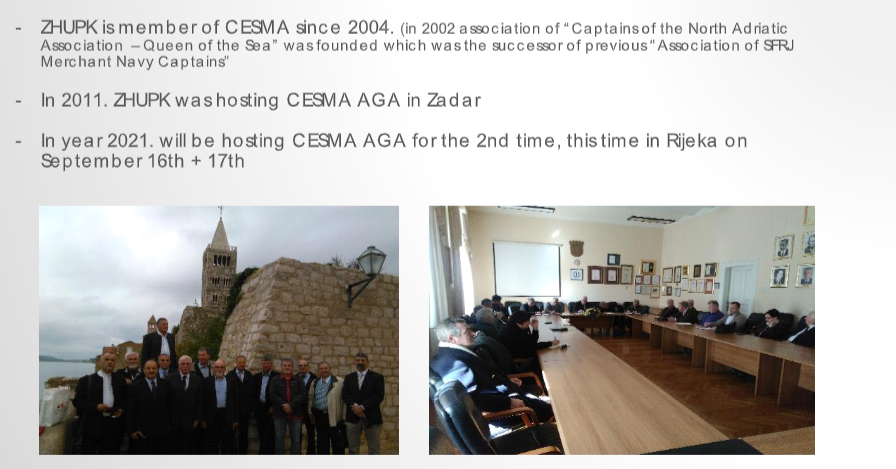
MINUTES OF THE CESMA BOARD MEETING ON 28TH MAY 2021 MADE ON
LINE VIA GOOGLE MEET
Those present: Captain H. Ardillon, President (AFCAN, France), Captain D. Dimitrov,
Deputy President, (BSMA, Bulgaria), Captain M. Badell Serra, Vice President, (ACCMM, Spain),
Captain J. Karnincic, UKPTM, Croatia.
The Board was welcomed on line by the President of CESMA, Captain Hubert Ardillon.
Agenda for the Board Meeting was adopted as proposed:
1. CESMA AGA 2021 - date, agenda;
2. Any other matter.
Captain Leo Geenevasen, CESMA Admnistrator is absent from the meeting.
ITEM 1: CESMA AGA 2021 – date, agenda
Capt. Karnincic confirmed the dates for 26th CESMA AGA in Rijeka, Croatia to be held on
17th September 2021 preceded by Council Meeting on 16th September.
Capt. Dimitrov presented the preliminary agenda for both the council meeting and AGA. He
proposed EMSA Deputy Director and Head of Digitalization Department Mr. Peter Kirov to be
invited to the AGA. The proposals had been adopted and agenda for the Council meeting and AGA
were adopted as preliminary with further confirmation later.
Capt. Dimitrov informed the Board members about the opinion of capt. Geenevasen,
CESMA Administrator, that the last agreed the dates for AGA and Council Meeting and proposed
preliminary agenda after phone conversation early in the morning on that date.
A decision had been taken capt. Hardillon to send official message to CESMA organizations
with the following draft:
26th CESMA AGA will be held in Rijeka, Croatia on 17th September 2021 preceded by
seminar on the same date in the morning. Preliminary agenda for both AGA and seminar are attached
to the minutes and the message;
CESMA Council Meeting will be held on 16th September 2021 with the preliminary agenda
as attached. Agenda item 10 capt. Hubert Ardillon, CESMA President (as per the statutes cannot be
elected as President after two successful consecutive mandates) is available for Secretary General
position, Capt. Dimitar Dimitrov, CESMA Deputy President is available for Position of President;
Proposals for all the positions for Council Meeting Agenda Item 10 will be accepted in the
Board from organizations as per the Statutes till 15th July 2021;
Proposals for Council Meeting Agenda Item 13, 27th CESMA AGA organization are kindly
welcome by all the member organizations.
ITEM 2: Any other matters
Capt. Karnincic informed the Board that hotel for the guests and Board members had been
arranged already.
Closure by the President.
The President, Captain Hubert Ardillon , thanked the attendants of the Board meeting for
their input and closes the meeting.
Captain H. Ardillon Captain D. Dimitrov
President 28th May 2021 Acting General Secretary
INFORMATION FROM ROMANIAN SHIPMASTERS ASSOCIAITON
Our Romanian colleagues sent to CESMA Board the below quoted message:
We came aware about a very strange situation, involving a Romanian Master family.
Capt. Sandu Dan passed away onboard M/V Vantage Wave, under the Liberian flag, on April 19, 2021, four
days after the ship left a port in India. He felt unwell and most likely suffered a fatal heart attack, on
a background of a pre-existing condition. The ship owners tried to send the body back to Romania,
without success, although it transited several ports specifically for this: Singapore, Taiwan, South
Korea, Malaysia,Vietnam, even Japan.
The ship arrived at its destination in China on May 7, 2021, but the authorities have not yet allowed
the ship to enter for operation until today.
So far, all possible steps have been taken at the Romanian Embassy in Beijing, ITF Romania, the
Chinese agents, the insurers, the Romanian Ministry of Foreign Affairs, the Chinese Embassy in
Bucharest, lawyers and ministerial advisers, without any success.
The family required at least his ashes to be brought back to Romania, but Chinese authorities,
suggest burial “at sea” because are afraid of Indian Type of COVID-19, even if there are more than
2 months since the vessel called India.
In this moment the Romanian ministry of Defense is still working on how to bring the Captain’s body
home for proper funerals.
In solidarity with our deceased colleague, RSMA is considering a “Japanese Strike” amongst our
Romanian Captains and crew, but the effect will be much stronger if our colleagues from
international fleet will join us.
“Japanese Strike” means just wearing a band or symbol for solidarity, without affecting their, duties,
schedule, Shipowners or local authorities.
Please let us know what is your opinion, and if we cand rely on your support in our action. Any kind
of suggestion, advice or assistance from your side in order to speed up this matter will be highly
appreciated.
Capt. Lucian MURARIU, ACNR Vice President, Founding Member
In solidarity with our Romanian colleagues CESMA Board sent the below letter to EU officials:
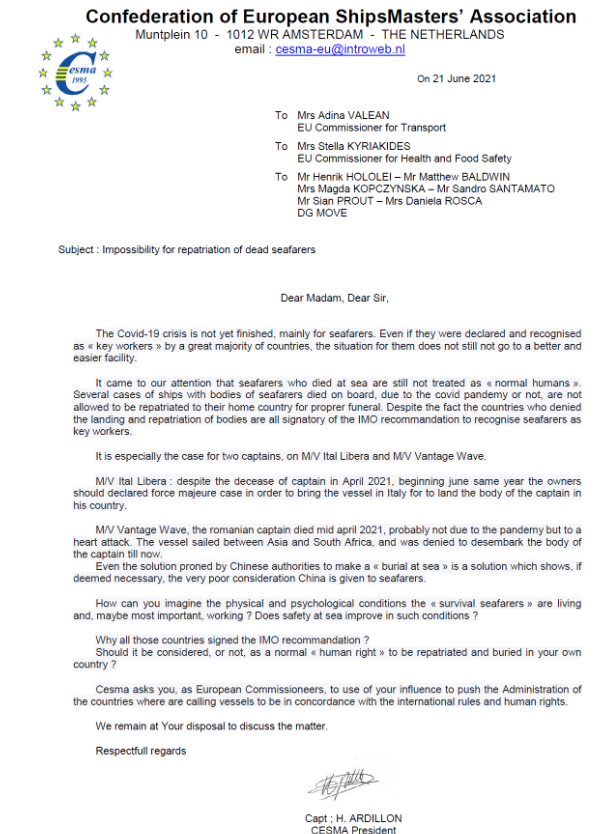
REPORT ON ANNUAL CESMA COUNCIL MEETING IN KOTOR, MONTENEGRO ON 4TH MAY 2018
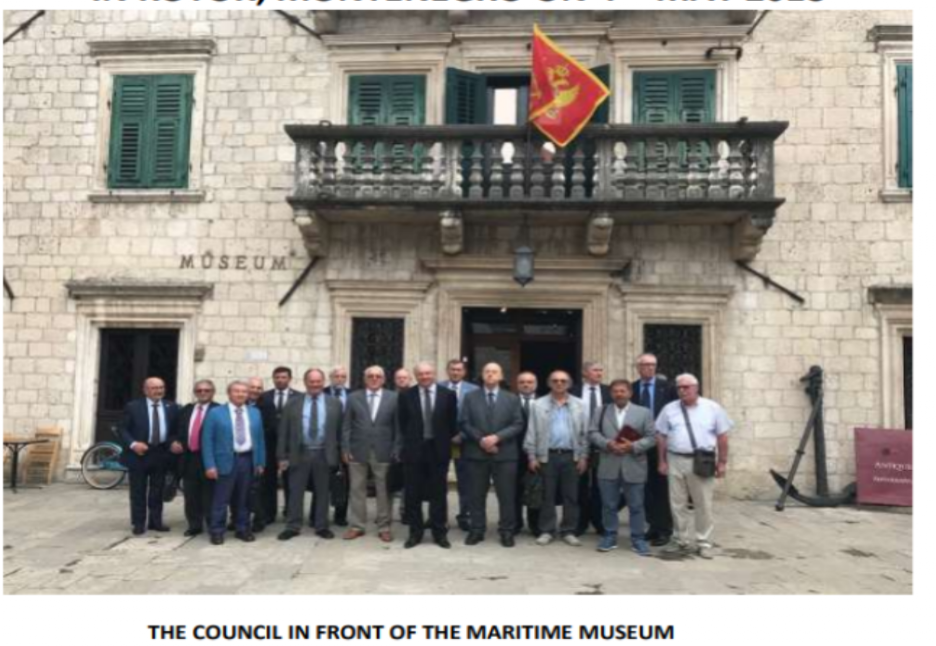
This year the CESMA Annual General Assembly was organized by the Montenegro Shipmasters’ Association in the ancient city of Kotor, Montenegro, a good example of a well conserved medieval city, full of Roman and Venetian influences and a rich maritime past. This became evident after a visit of the local maritime museum by the CESMA representatives, who had come all the way to Kotor to attend the CESMA AGA 2018. The visit preceded the council meeting in the afternoon.
The council meeting of the yearly CESMA Assembly, discussing mainly husbandry matters, took place in the small Church of Saint Paul, another example of ancient Kotor. The meeting was attended by representatives of CESMA member associations from 12 EU and future EU nations. Shipmasters from host country Montenegro, Croatia, Italy, Latvia, Spain, Ireland, Germany, France, Belgium, Slovenia, Bulgaria and The Netherlands attend the meeting.
The CESMA council was shortly welcomed by the host, Captain Mario Pilastro, president of the Montenegro Shipmasters Association. Since last year, there were a few changes in the composition of the council. Captain J. Cortada Bover represented this year the ACCMM of Barcelona, Spain, as Captain Badell Serra was otherwise occupied. Captain Wolf von Pressentin again represented VDKS, Germany, after his recovery
According to reports from the general secretary on the financial situation and the activities in 2017, including representations by CESMA (council/ board) members, the year 2017 can be considered as extraordinary, caused by the health condition of the general secretary, who usually takes care of the greater part of CESMA representations. The relevant financial advantage will be added to the reserves, stabilizing the situation for the immediate future.
The important issue for this council meeting was the resignation of deputy president Captain
Roberto Surez, elected in 2016 in Cork, Ireland. On second thoughts, he could not combine his tasks
in his professional career with the activities of the deputy presidency of CESMA. For this reason an
election was necessary for a new deputy president. Three associations had presented candidates,
making an election procedure necessary. As members of the board were also acting as council
members (entitled to vote), the election procedure was handled by the hosting association, the
Montenegro shipmasters. After two rounds of voting, necessary for a normal majority, Captain
Dimitar Dimitrov was elected as deputy president. Captain Dimitrov has a long experience in the
CESMA council and will present himself further on in this issue of the CESMA NEWS.
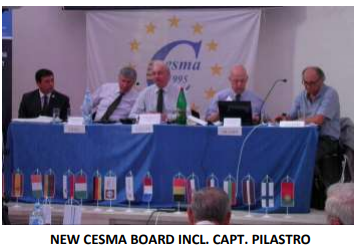
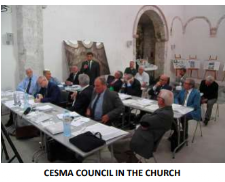
Membership increased with two associations. The Asociacion Vizcaina de Capitanes de la Marina
Mercante (AVCCMM) from Bilbao, Spain, rejoined CESMA as a full member after some years of
consideration. The Helsinki Shipmasters’
Association from Finland became observer
member, as the first in this category. Being
a smaller association, the Helsinki shipmasters
choose for observer membership,
giving it the possibility to be fully involved
in CESMA technical matters concerning
the maritime profession and industry.
We are pleased to welcome the first
association in Scandinavia as our member.
CESMA now counts 20 shipmasters’
associations in 15 European maritime
nations. A number of associations is still
considering membership.
Communication with members and informing other parties has improved by the new lay-out of the
CESMA NEWS and the re-installation of the website. Other means were discussed but face book was
considered not applicable due to safety of information issues. We keep looking for means to reach
younger seafarers and interest them for association membership. Good cooperation with other
maritime associations and organisations such as IFSMA, The Nautical Institute, EMSA and ECSA are
important and will be continued as they could influence discussions and decisions on maritime safety
and security being made at IMO in London. Concluding the Council Meeting. The president Capt.
Hubert Ardillon thanked all participants for their input in the discussions and decisions.
The day was concluded with a visit to the maritime faculty in Kotor. The Dean of the faculty
explained about the aims and possibilities of the faculty. The visit was concluded with a visit to the
simulator which is very important for training purposes of the students.
INTRODUCTION OF NEW CESMA DEPUTY PRESIDENT
As newly elected Deputy President of CESMA during the 23rd CESMA
AGA, I want to thank CESMA members for their vote and to assure you
that I’ll make all I can do to promote our organization as professional
organization of European shipmasters.
As council member I joined CESMA in 2007,
being Chairman of the Board of Bulgarian
Shipmasters’ Association and since then I
attended CESMA AGA’s during all the years up
to now. Our association is not big but we try
to unite our colleagues from Bulgaria and to
express their voice in the European family of
shipmasters. We face problems, shared by all
colleagues, that young officers and shipmasters
are no longer interested in
participation of professional organizations as
they have internet, facebook, twitter and all
the other means of communication and they
think they do not need membership of
organization like ours.
During the CESMA AGA in Riga 2017, I established a face book group “CESMA” and tried to promote
a new way of communication between our members in order to be more attractive and closer to our
young members. We have to be in line with the new trends of the industry as automation,
computerization, digitalization, etc. At the same time I reconfirm my opinion, as expressed in the
previous edition of CESMA News of the necessity to keep traditional navigational skills and especially
mentality of maritime professionals that even on board automated, computerized and digitalized
ships we still need our safety culture and readiness to act in any situation of failure of electronic
systems, computers on board ships and other equipment and systems accordingly. Going further, we
have to transfer that safety culture to the maritime industry stakeholders and future shore based
captains navigating autonomous ships from shore and computers which will run autonomous ships.
In the last ten years, CESMA remained a purely professional organization, independent from
business or trade union influence. In that way, our opinion on industry or professional matters is
valuable as all members are non-profitable organizations and so we put safety at sea as our primary
goal without commercialization. At the same time we have to be careful to keep the attractiveness of
our organization and to be in favor of the daily life of shipmasters. Good example was the
intervention of our secretary general, captain Fredrik Van Wijnen in Panama and his attendance
during the trial of Bulgarian shipmaster Svetlozar Sobadzhiev, accused of drug trafficking in Panama.
Support of our members in their daily life on board as well as providing actual professional
information is the key factor to attract more colleagues to join our associations and to retain them
during their professional career.
TO BECOME MARITIME AMBASSADOR,
CAPT. DIMITROV MEETS MR. KITACK LIM,
IMO SECRETARY GENERAL
5
Being Deputy President, my intention is to assist in the activities of our CESMA board and our
Secretary General, representing CESMA on regional, European and international level. Our ambitious
number of resolutions requires a lot of efforts from either the CESMA board or all member
associations to get into practice our ideas and to be in assistance to all member shipmasters. Latest
discussions about training of young seafarers and necessity of harmonization and standardization of
different approaches in European countries and consolidation of our opinion, express how our
common interests could unite us. (Capt. Dimitar Dimitrov)
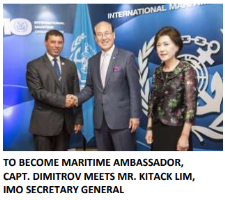
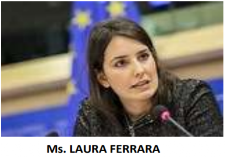
They describe the slowness of the Italian authorities in
renewing essential certificates as a bureaucratic disorder
which is putting seafarers’ jobs in danger. Therefore they
request for an urgent action to be taken by the Italian
transport ministry. The problems have been raised in the
European Parliament by Italian MEP Mrs Laura Ferrara,
highlighting concerns that the gap between international
regulations and stricter standards imposed by Italian
legislation is making it extremely complicated for the
country’s seafarers to update and renew certificates.
European transport commissioner Mrs. Violeta Bulc commented that the European Commission
has initiated an infringement procedure against the state of Italy as a result of ”outstanding
deficiencies in the application of a EU directive covering maritime education and training
programmes, including problems with course designs, review and approval, recognition of
certificates, certification and endorsement for engineer officers at management level and
requirements for certification”.
As a result there is a very real risk that thousands of Italian seafarers could lose their jobs as a
consequence of problems with the issue of internationally approved sea safety certificates. The
Italian ministry of transport’s slowness in organising and approving national courses is creating
serious difficulties. It is unacceptable that many seafarers have already paid 1.000 euro for an update
course or 2.000 euro for a basic certificate and are still waiting for further developments.
The European Commission has also accused Italy of failing to provide full information on what steps
it has taken to implement the EU directive on the Maritime Labour Convention and has warned that
it may refer the case to the European Court of Justice.
RESOLUTIONS FROM 23rd CESMA AGA ON 5 th MAY 2018 AT THE CATTARO HOTEL IN KOTOR, MONTENEGRO.
Resolution nr. 1: Criminalisation of seafarers.
The 23th Annual General Assembly in Kotor, again noted that the problem of criminalisation of seafarers and of shipmasters in particular, continues to be a matter of great concern. CESMA urgently requests ship owners and/or operators to always provide legal assistance for masters, serving on their ships, in case of an incident as a consequence of which they are detained by local authorities, until, at least, a verdict has been pronounced. Moreover masters are urgently advised to consider taking a risk insurance.
Resolution nr. 2: Piracy.
The Assembly again discussed the problem of piracy against ships in various parts of the world, with attacks on ships in the West Africa area still frequent and violent, while piracy in seas around Somalia seems to increase lately. CESMA no longer resists the use of armed security teams, either military or private but also advocates the use of non-violent measures which become more and more sophisticated as an alternative, in combination with BMP 4 practices. Under all circumstances the authority of the master should be efficaciously maintained, except when fire-arms have to be used. CESMA also insists on exact rules of engagements to be observed under all circumstances.
Resolution nr. 3: Fatigue and safe manning.
The Assembly again discussed the problem of fatigue in the maritime industry. The requirement of a minimum of three certified bridge watch keepers, including the master, on each seagoing vessel of 500 GT and more, is still supported by CESMA, although we see improvement due to better controls by some flag states (Spain) and Port State Control officers. It continues to urge Port State Control officers to intensify verification of work and rest periods during shipboard inspections. CESMA Supports the results of the Martha project.
Resolution no. 4: Safety of roro- and large passenger ships.
The Assembly again discussed the safety of roro- and large passenger ships as well as car carriers. Disembarking a great number of passengers and crew in an emergency situation continues to be a great concern. Damage stability as a result of flooded decks and/or holds caused by an accident, is still not sufficiently observed, also with regard to new buildings. Recently ordered vessels seem to show improvements due to lessons learned from the “Costa Concordia” accident.
Resolution no. 5: Mooring accidents.
The Assembly again expresses its concern about the increase of serious mooring accidents on board and ashore. Reasons discussed are the increase in sizes of vessels, lay-out of harbours, mooring equipment used and the ability and number of crew at the mooring stations. Another issue is disturbances in communication due to language problems.
Resolution nr. 6: Employment of EU seafarers.
Following the growing shortage of EU officers, employed on EU flag ships, also due to complicated procedures by some administrations regarding training and certification, the Assembly again urges EU administrations to support their respective seafarers by recognizing certificates issued by all EU administrations and enforcing simpler issue/renewal procedures for certificates of EU officers. CESMA again appeals to EU ship owners to create opportunities for young EU officers to complete their practical education and training and obtain their certificates. In this way maritime knowledge and experience within the EU maritime industry can be maintained. All efforts should be employed to interest young people in the EU to choose for a maritime career.
Resolution nr. 7: Illegal immigrants in the Mediterranean.
The Assembly again noted with concern the situation in the Mediterranean where illegal immigrants try to reach Europe by using unseaworthy craft which sometimes, due to overcrowding and bad condition, require assistance from merchant navy vessels nearby. According to the SOLAS Convention, ships are obliged to render assistance and take the immigrants on board. This could lead to dangerous situations whereby the crew is outnumbered by the quantity of immigrants. Moreover their intentions and medical condition are unknown, as most ships have no professional medical staff on board. As a consequence, vessel and crew could be endangered. The Assembly again wants to convey its concern to the European Commission and Parliament, as well as the IMO, in this respect.
Resolution nr. 8: Future of simulator training in the EU maritime industry.
The Assembly again underlines the importance of simulator training in the maritime industry. However it urges EU administrations to standardise exchanging of practical education and training periods by simulator training as “sea time equivalent”.
Resolution nr. 9: Reduction of paperwork on board.
The Assembly urgently requests governments and authorities to intervene in reducing the many documents to be completed by vessels before and between entering ports, as they severely increase the working load on board, particularly of the master, who is primarily responsible for the safe navigation of the vessel, especially in confined waters.
Resolution nr. 10: Safe construction of Very Large Ore Carriers (VLOC’s).
The Assembly, noting with concern the large number of seafarers missing at shipwrecks of VLOC’s, asks international maritime authorities, including the European Union, to not close their eyes on a kind of fatality that could convict seafarers aboard this vessel type to death. It urgently requests the European Union and its member states to push the International Maritime Organisation (IMO) to create clear legislation on VLOC’s. This includes the prohibition of conversion of Very Large Crude Carriers (VLCC’s) into VLOC’s, as well as their current operation. The Assembly also expressed concern about the liquefaction of certain bulk cargoes, such as bauxite ore, on bulk carriers, causing this type of vessels to suddenly capsize during their voyage and sink with all crew on board lost.
Resolution nr. 11: Decrease of traditional navigational skills.
The Assembly noted again, with great concern, the decrease of traditional navigational skills among younger shipmasters and officers on board. Recent development of electronic equipment facilitates position fixing by satellite systems. However latest breaches in cyber security, such as jamming of GPS, raise the importance of a backup system. CESMA calls for relevant action by the European Commission and IMO to maintain proper legislation regarding safe watch keeping and use of satellite systems together with traditional navigational skills. In this process, CESMA encourages maritime and qualification institutes to pay attention in their curriculums to traditional navigational skills. Also to the ability to change over in good time in case of a GPS failure. CESMA also encourages the present generation of seafarers to use all efforts, via mentoring on board or any other means, to transfer their knowledge.
Resolution nr. 12: Harmonizing of seafarer’s certificates in the EU.
CESMA urgently requests the European Parliament and Commission, as well as all maritime EU Member States, to provide proper initiatives to harmonize procedures for training certificates of seafarers. These include certificates of training and refreshment courses, issued by EU based training institutions which should be recognized by all EU member states, both for service on EU and foreign flag vessels, in order to facilitate mobility of seafarers and reduce financial burden.
Kotor (Montenegro) 5th May 2018
HAPPY INTERNATIONAL DAY OF THE SEAFARER
Each year, on June 25th
, the International Maritime Organization marks the
Day of the Seafarer as a way to recognize the global seafaring community, as
well as seafarers’ contributions to the overall global economy.
Each year, the IMO designates a theme which it highlights
through social media campaigns. The 2018 Day of the
Seafarer theme is “seafarers’ well-being”, which according
to IMO, is a topic that has gained strong momentum
throughout the industry in recent years.
“By addressing the issue of seafarers’ well-being and particularly mental health, this
campaign can inform specific strategies to tackle stress and other issues affecting
seafarers’ mental conditions – and make the tools available more widely known,”
the IMO said.


